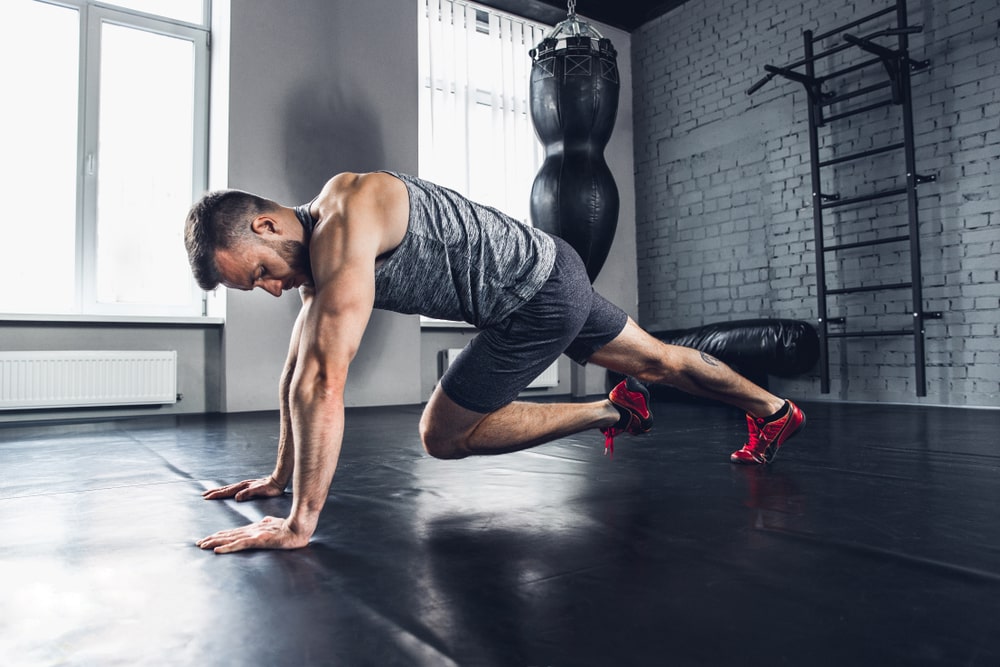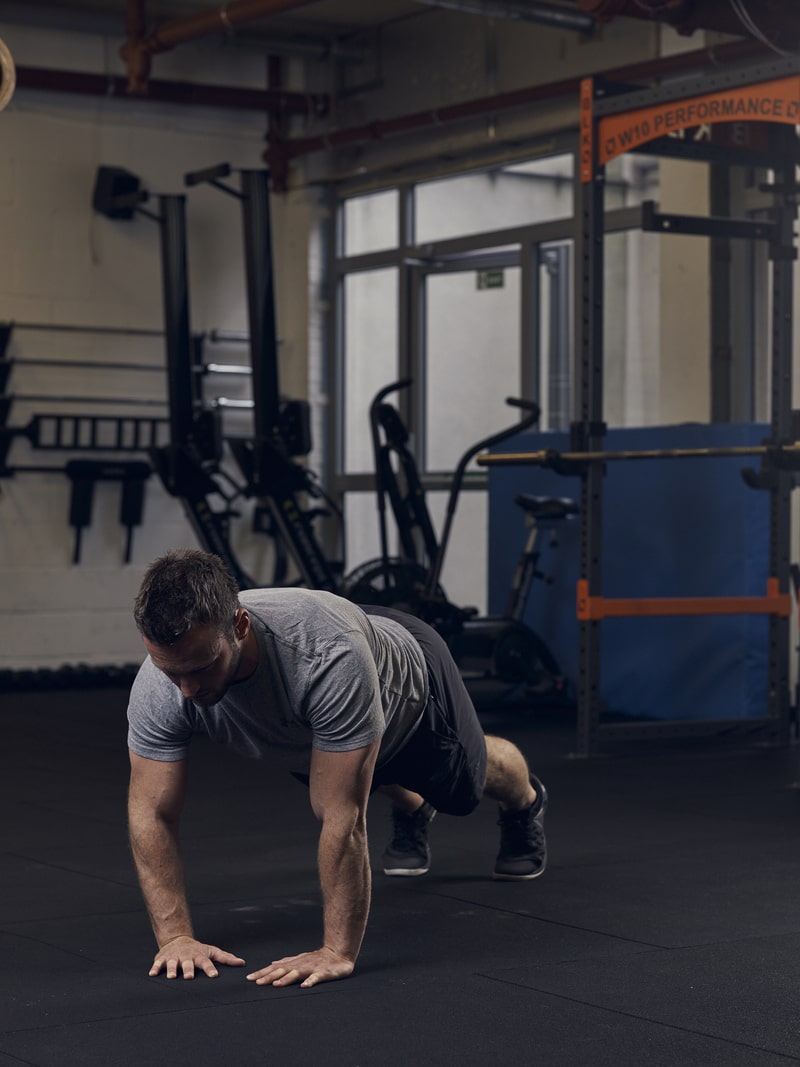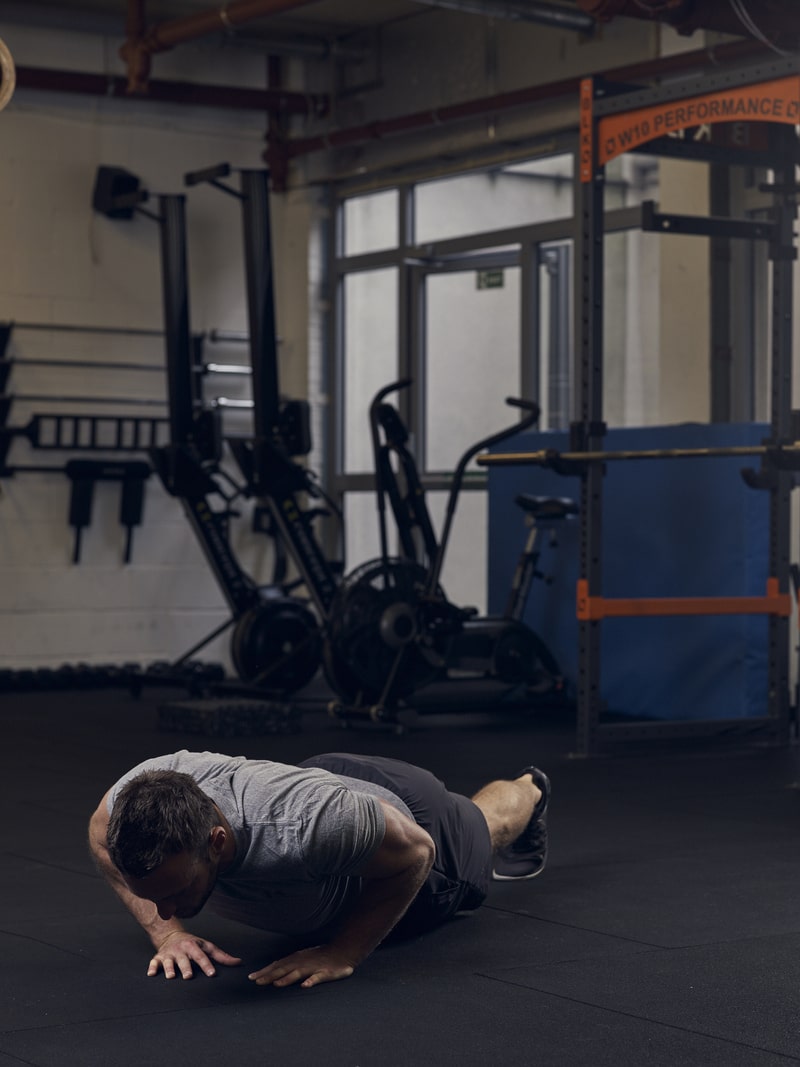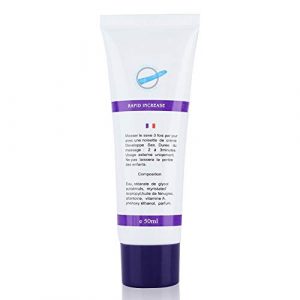We’ve rounded up the best bodyweight exercises to help you build muscle and burn fat – no equipment needed…
No kit is no problem with the best bodyweight exercises. As Olympic gymnasts, your local park’s calisthenics crew and huge numbers of prisoners have known for years, you can train pretty much any muscle with just your own body, a towel-sized space on the floor and some ingenuity.
In fact, it’s a good idea to build a base of strength using bodyweight moves before you pick up a dumbbell: as well as helping to prevent injury, it’ll improve coordination and proprioception (your sense of where your body parts are in relation to each other), increasing your control over your own movements.
Here you’ll learn enough essential bodyweight moves to be able to put together a workout anywhere, whether your goal is fat loss, muscle or performance. Aim to hit a respectable amount of reps in the key moves – press-ups, squats and lunges – and you’ll do better at almost anything.
What are bodyweight exercises?
Bodyweight exercises are moves you can do on your own, anywhere at all. Rather than adding in weight, in the form of free weights or machines, the resistance is provided by your own bodyweight. This makes them affordable and accessible, while still being hugely effective for building muscle.
Whether you’re a complete beginner or practiced pro, we’ve rounded up the best bodyweight exercises to add to your strength training regime, including top tips on perfecting your form and the reason why each exercise is so essential to helping you move better, get stronger and be as functionally fit as possible.
Benefits of bodyweight training
Think functional, full-body strength. Take the press-up: if you do it correctly, you’ll engage everything from your chest and triceps to your core and glutes, teaching the body to work as a unit. Bodyweight moves also lend themselves to circuit-style workouts: because they take minimal setting up, you can shift from one movement to another with zero fuss, making them ideal for high-intensity fat loss efforts. Finally, high-volume sessions can and will build muscle – especially if you use a combination of slow and fast reps to hit all your muscle fibres.
One of the other big perks of bodyweight exercises is affordability. With no need to pay out for expensive kit or monthly gym memberships, bodyweight exercises offer an accessible way to start strength training from home.
Another benefit of setting the weights to one side or stepping away from the machines is that you’re more likely to focus on perfecting your form. While many strength trainers concentrate solely on seeing how many kilos they can deadlift, taking the time to strip your training back to basics will help you hone in on mind-muscle connection and move through each exercise with greater control.
These are the best bodyweight exercises
Press-up variations
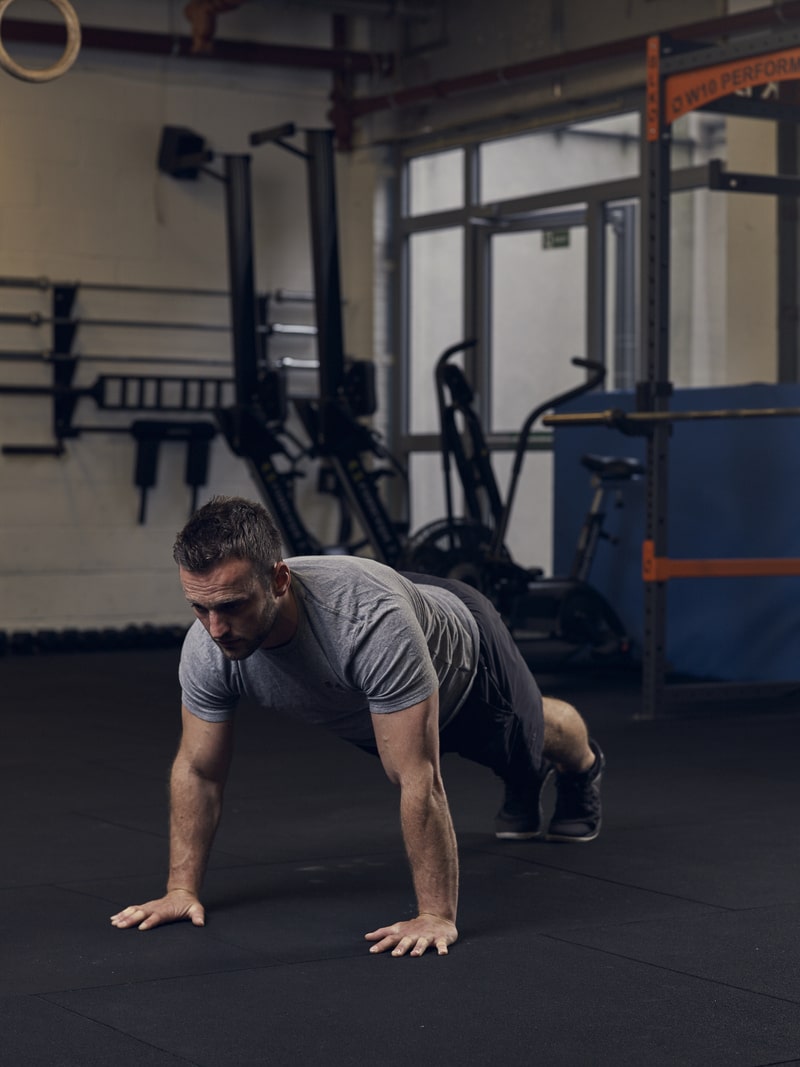
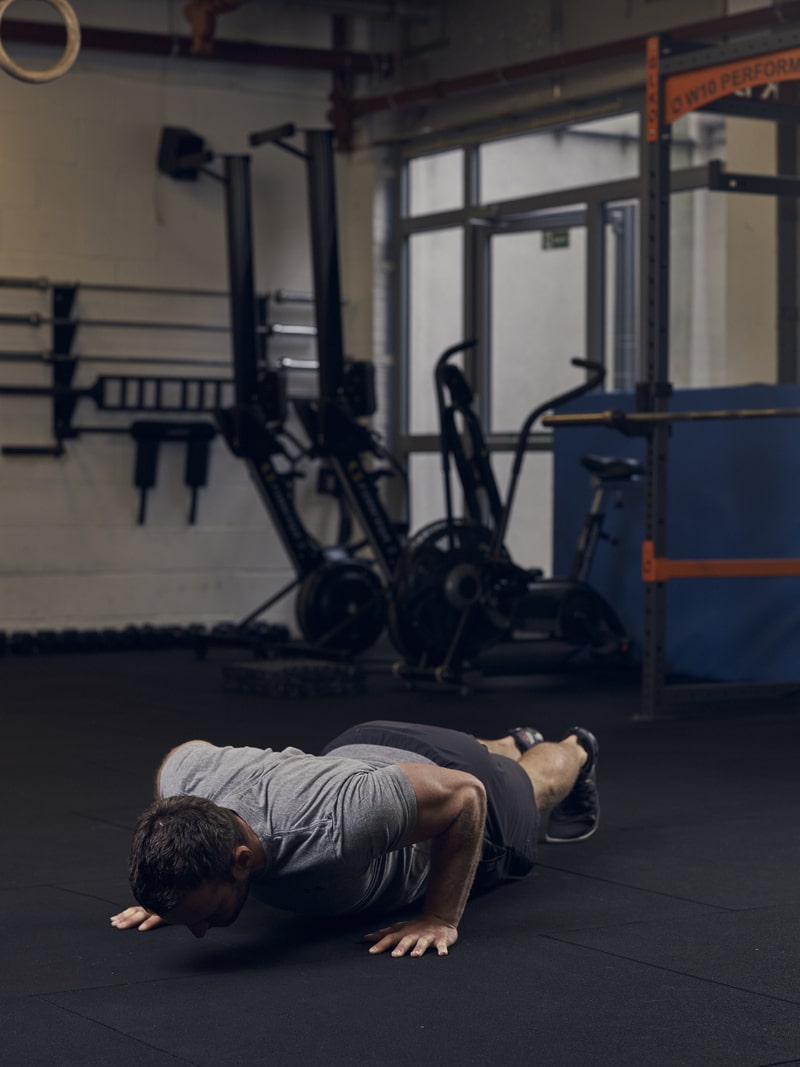
Press-up
Primary muscles: Chest, triceps
Benefits of press-ups: The classic go-anywhere chest builder will also work your core, as well as teaching you to hold full-body tension… if you do it right. Quality is more important than quantity, so focus on keeping good form each rep and staying straight as a board.
- Get into a press-up position with your hands just outside shoulder-width apart.
- Keeping your abs braced, lower your body until your chest touches the floor –keeping your thighs off it – then press up.
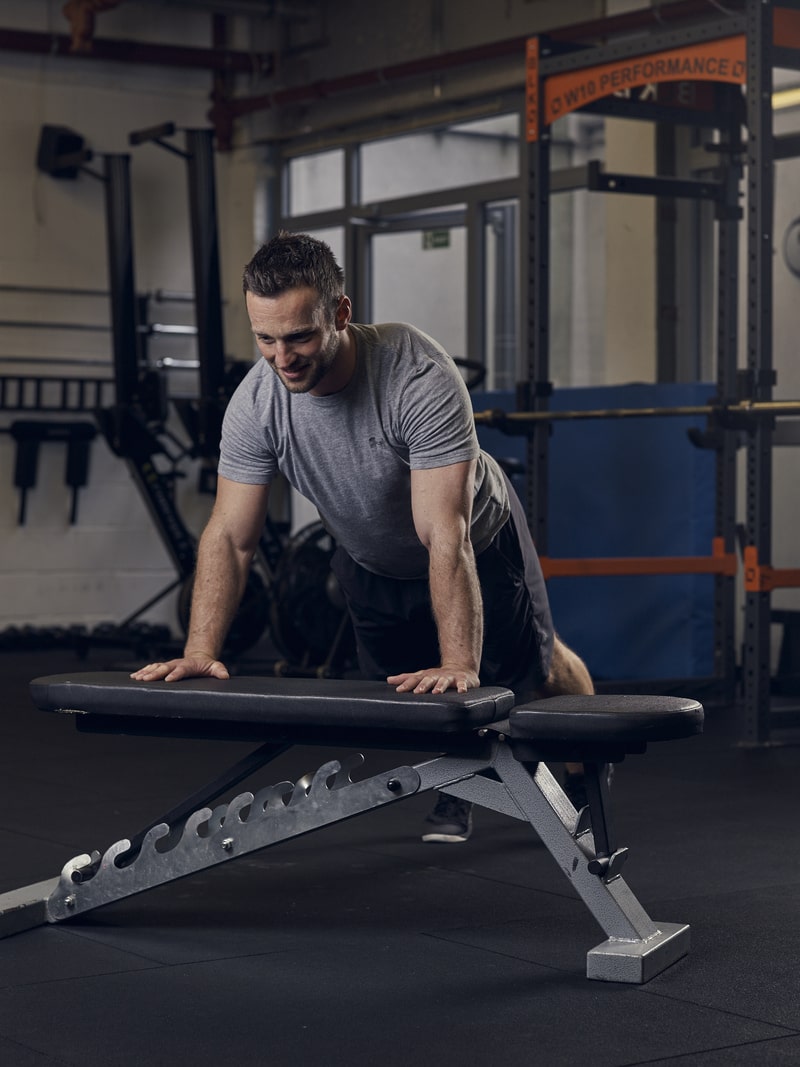
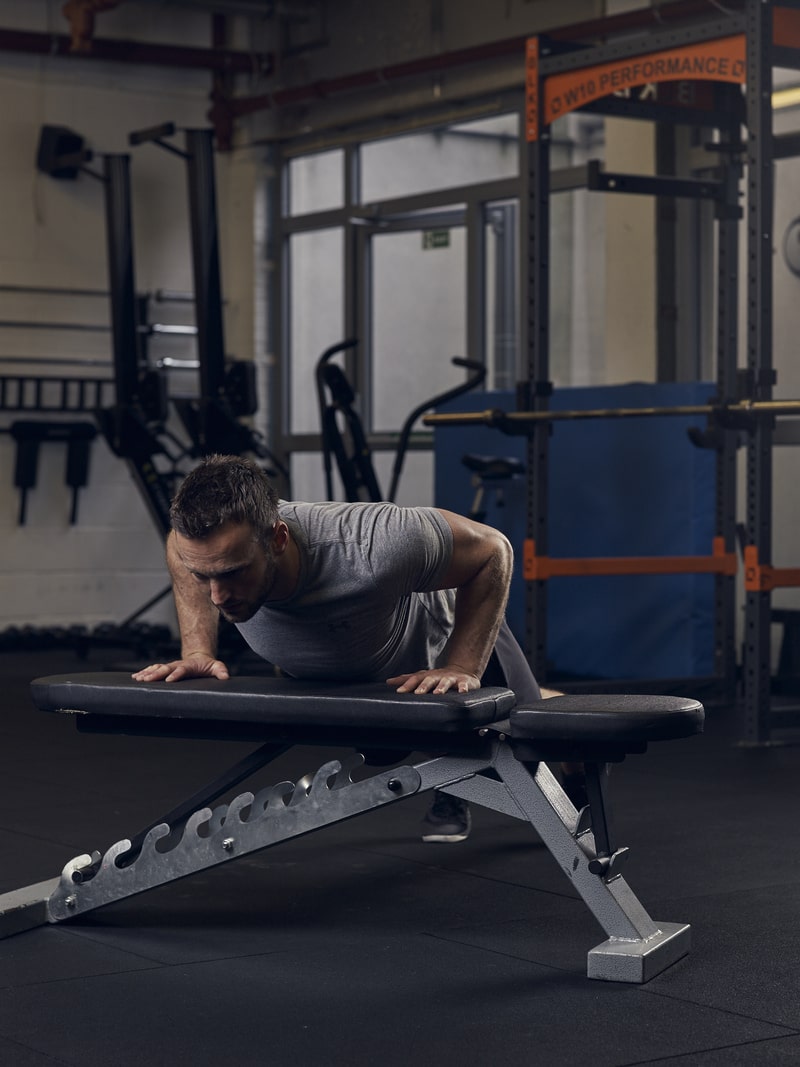
Incline press-up
Primary muscles: Chest, triceps
Benefits of incline press-ups: This variation is easier than the flat press-up but still teaches you to keep a strong core, so it’s a much better way to progress to the full move than doing press-ups on your knees. Start by doing them with your hands against a wall, then – once you can do 10 clean reps – move down to a table or chair, then the floor.
- Get into a press-up position with your hands just wider than shoulder-width apart, on a box, sofa, table or wall.
- Keeping your abs braced, lower your body until your chest touches the surface your hands are resting on.
- Press back up.
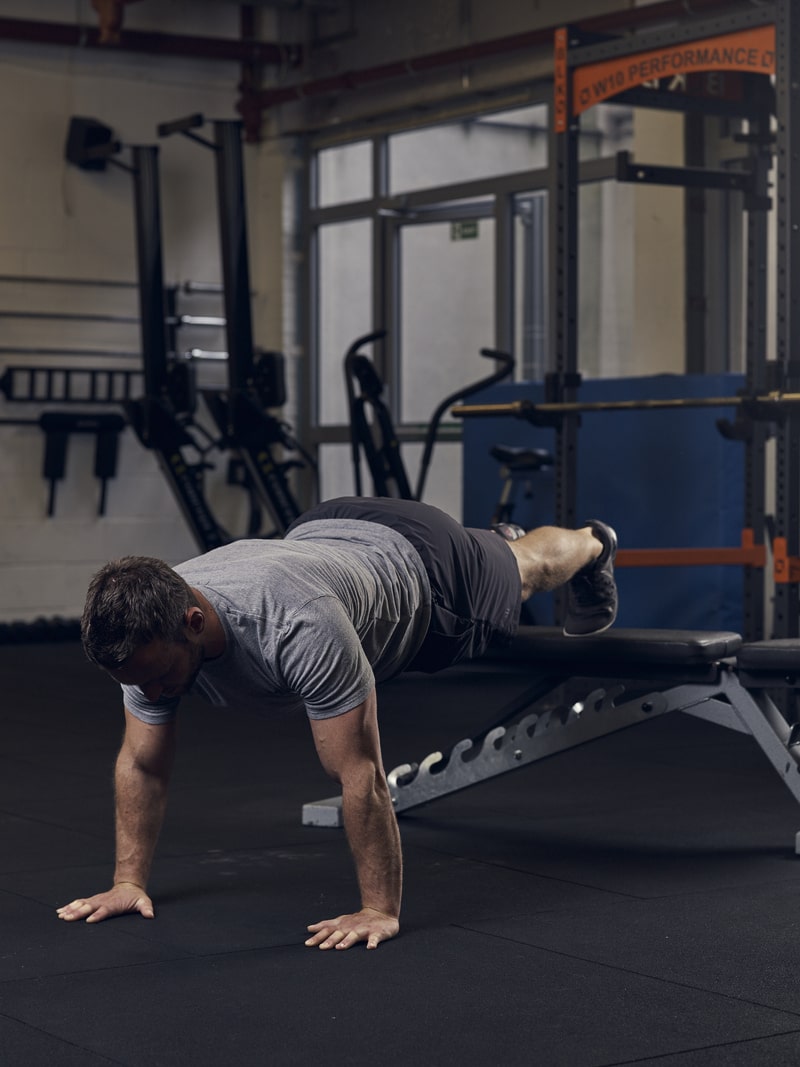
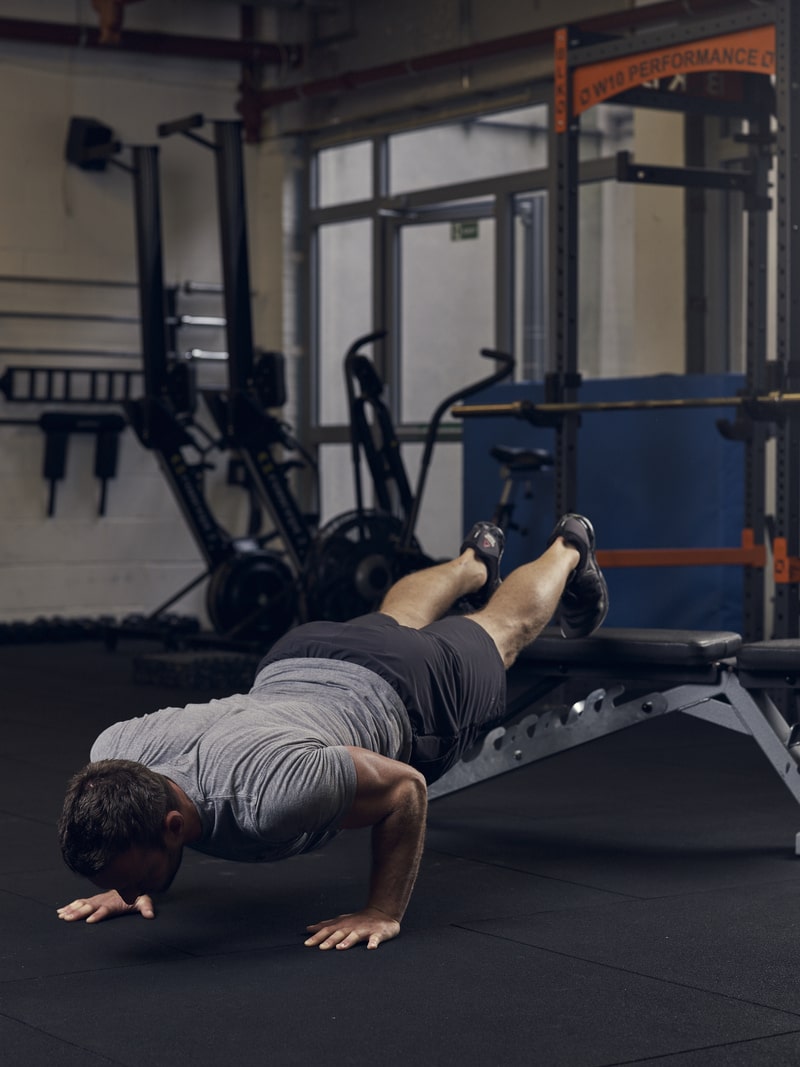
Decline press-up
Primary muscles: Chest, triceps
Benefits of decline press-ups: This move takes more strength than the standard press-up, while hitting your upper chest from a slightly different angle for all-round development.
- Get into a press-up position with your hands just wider than shoulder-width apart and your feet on a box, bench or sofa.
- Keeping your abs braced, lower your body until your chest touches the floor, then press back up.
Diamond press-up
Primary muscles: Chest, triceps
Benefits of diamond press-ups: This press-up variation places extra emphasis on your triceps, while slightly changing the stress on your chest to hit it from a different angle. Use it in a superset with regular press-ups for a guaranteed triceps-killer.
- Get into a press-up position, placing your hands close together so your thumbs and index fingers touch.
- Keeping your body in a straight line with your abs braced, lower your torso until your chest is just above the floor, then press back up.
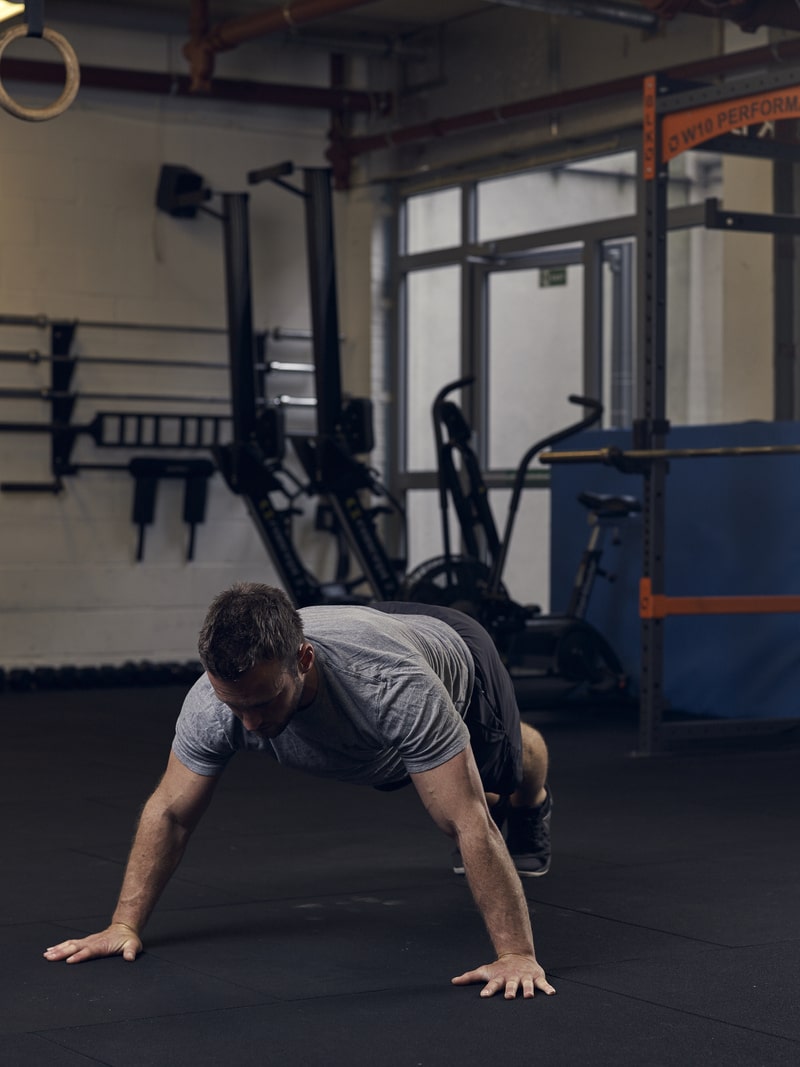
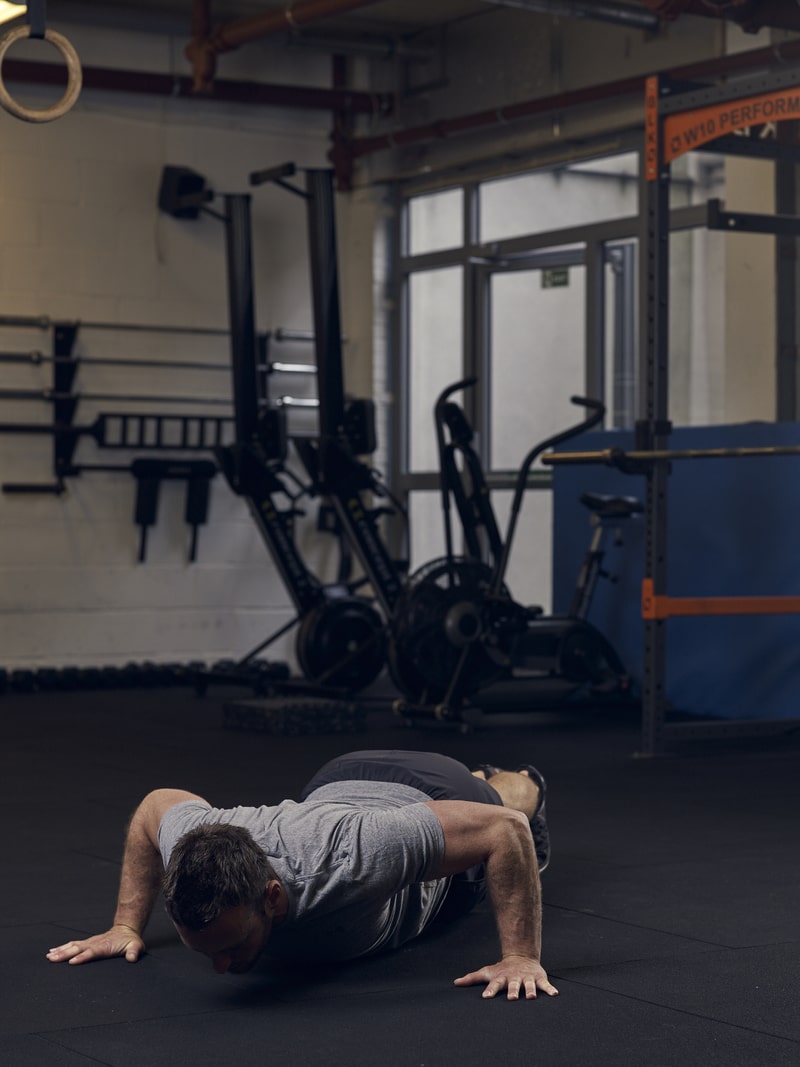
Wide press-up
Primary muscles: Chest, triceps
Benefits of wide press-ups: Though it can be slightly tougher on your shoulders than the regular press-ups – so men with flexibility problems might want to steer clear – this variation puts more emphasis on the chest than the traditional press-up.
- Get into a press-up position with your hands about double shoulder-width apart.
- Keeping your body in a straight line with your abs braced, lower your torso until your chest is just above the floor, then press back up.
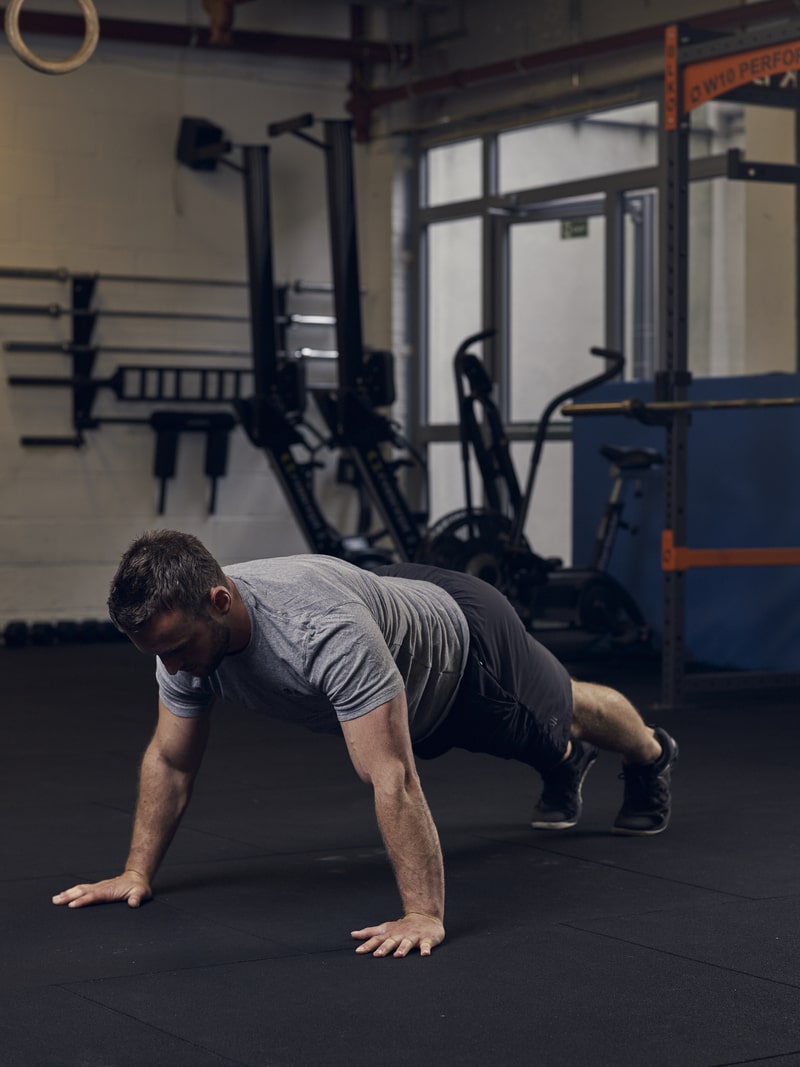
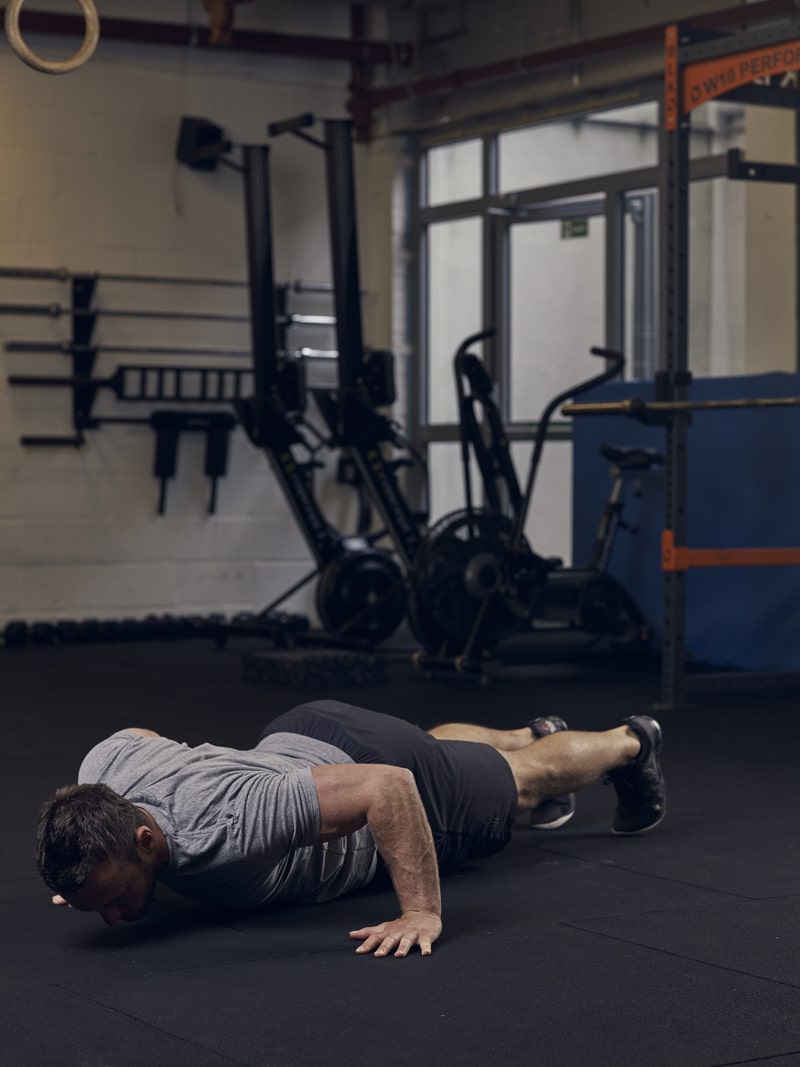
Archer press-up
Primary muscles: Chest, triceps
Benefits of archer press-ups: By shifting your centre of mass from one side to the other at the bottom of the press-up, you’ll work your chest across a greater range of motion than in almost any other move, prompting it to grow – while also keeping your shoulders in shape.
- From a press-up position with your hands slightly wider than normal, drop into the bottom of the move.
- Shift your body to just above one hand, then over to the other.
- On the next rep, go to the other side first.
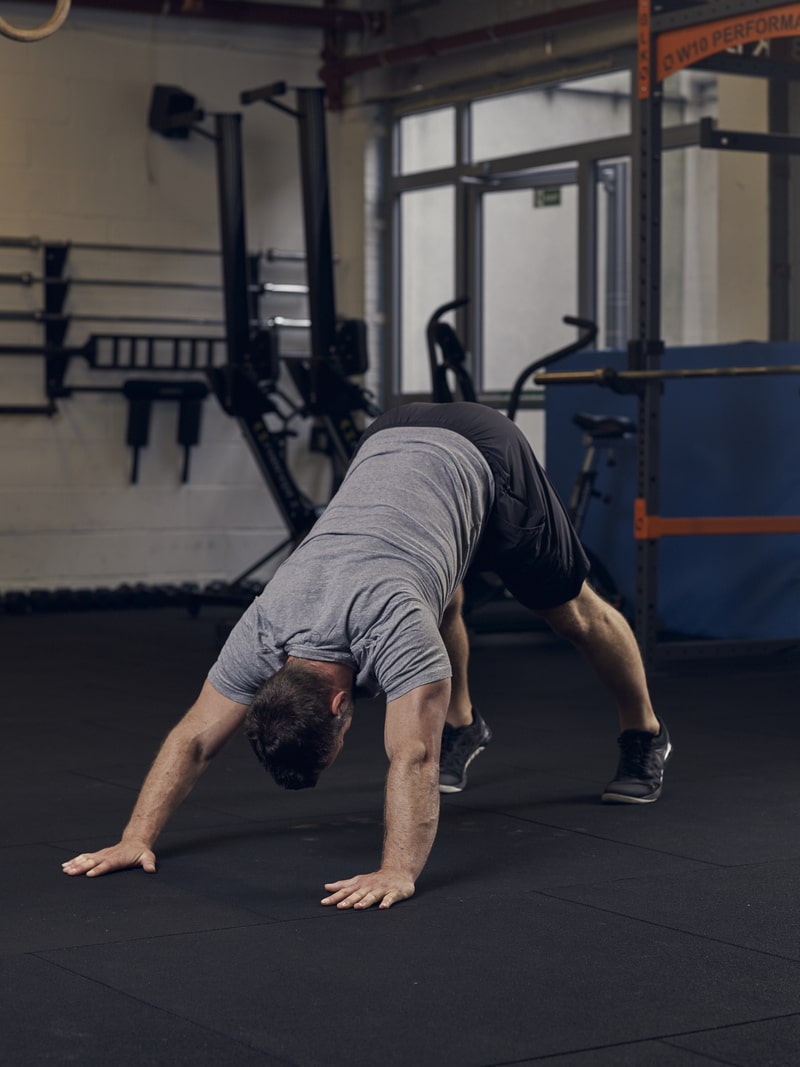
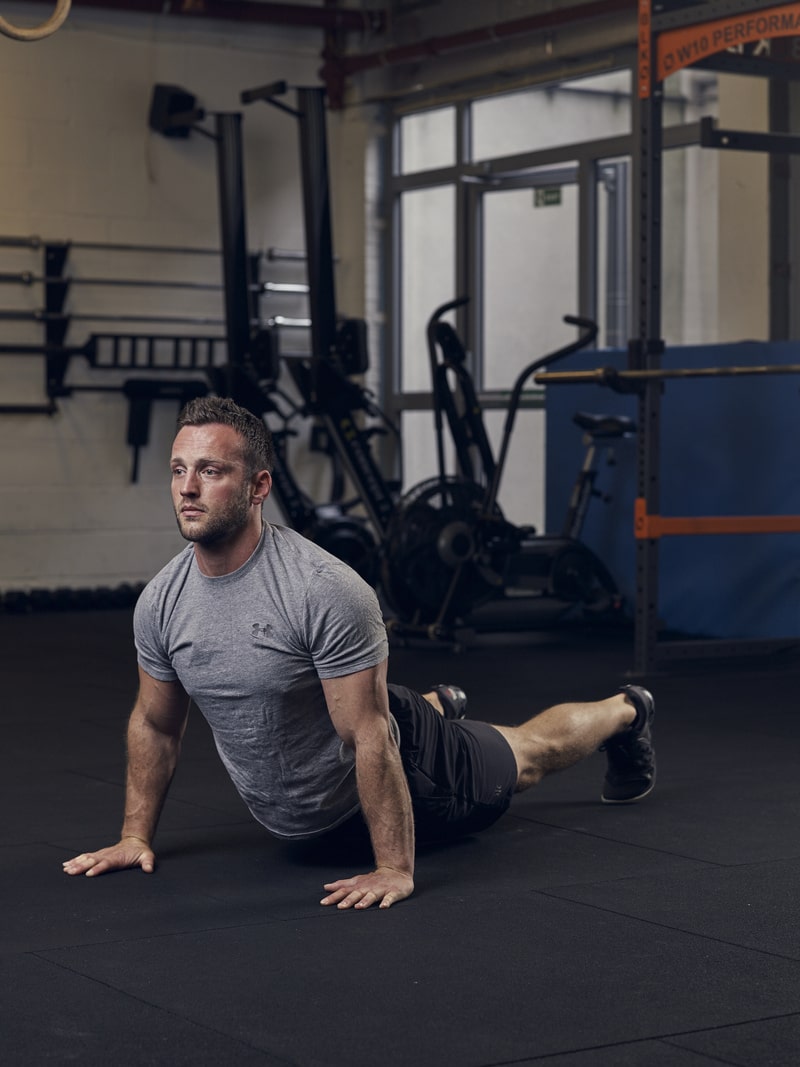
Divebomber press-up
Primary muscles: Chest, triceps, shoulders, core
Benefits of divebomber press-ups: This move, beloved of wrestlers, puts more pressure on your shoulders than the traditional press-up, and done in high reps it’s also an excellent test of cardio. Mix it into your workouts for an occasional challenge.
- Start in an inverted V-shape with your hands and feet on the floor.
- ‘Dive’ your head towards the floor, then along it, as if you were pushing a ball with your nose.
- Then arch upwards until your arms are straight and your chest is off the floor.
- Reverse the whole move to return to the start position.
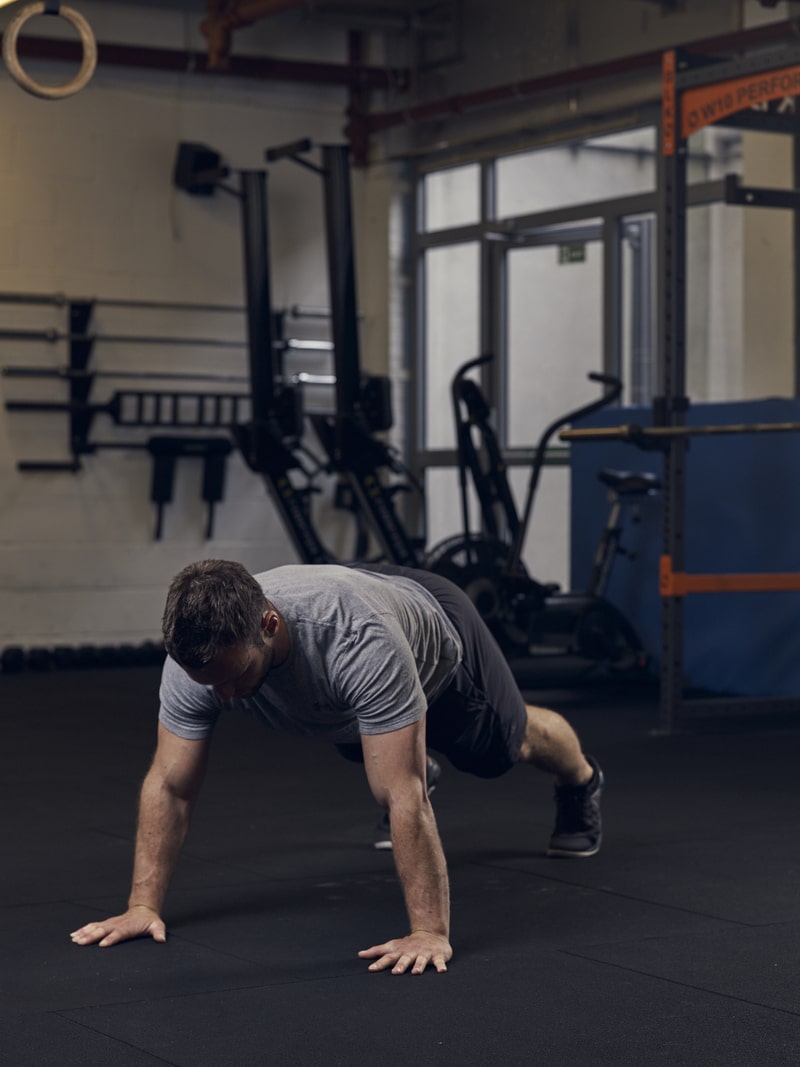
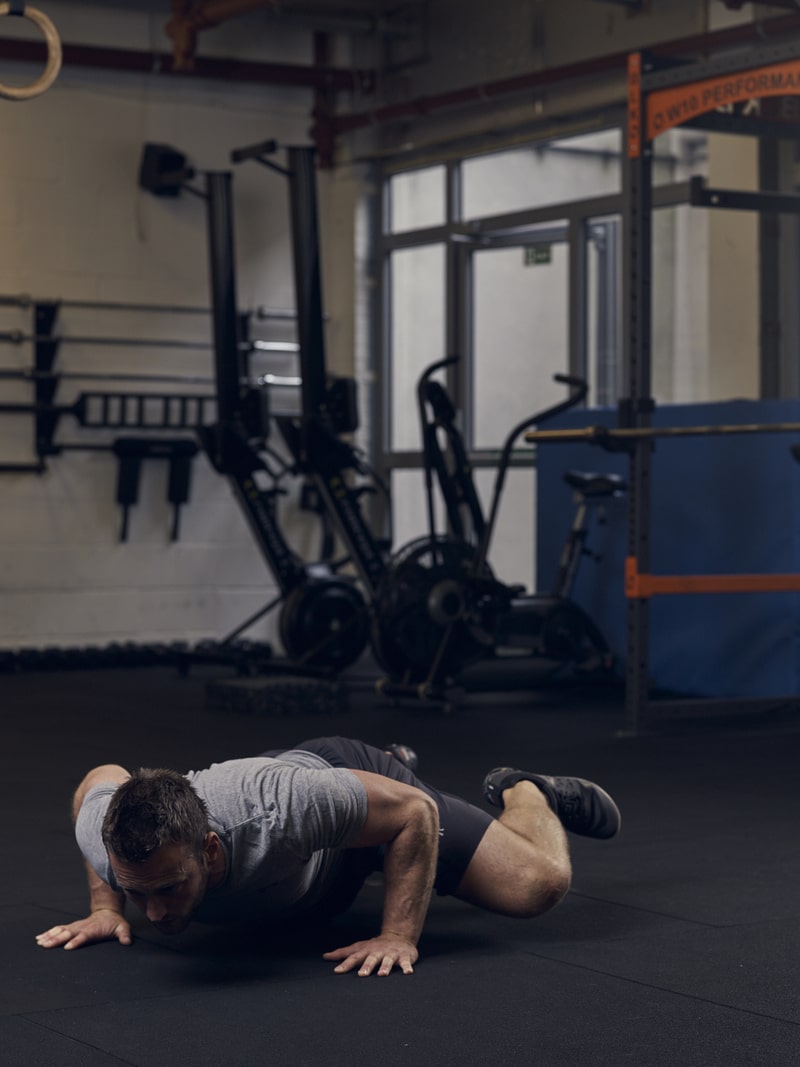
Spiderman press-up
Primary muscles: Chest, triceps, core
Benefits of Spiderman press-ups: By taking one foot off the floor you’ll force your stabiliser muscles to work overtime, as well as activating your core in order to stabilise your torso. For best results, keep the reps slow and controlled, and your body parallel to the floor throughout.
- From a press-up position, drop into the bottom of the move as you lift one foot off the floor and raise the knee to your elbow.
- Press back up, placing your foot back on the floor.
- Repeat on the other side.
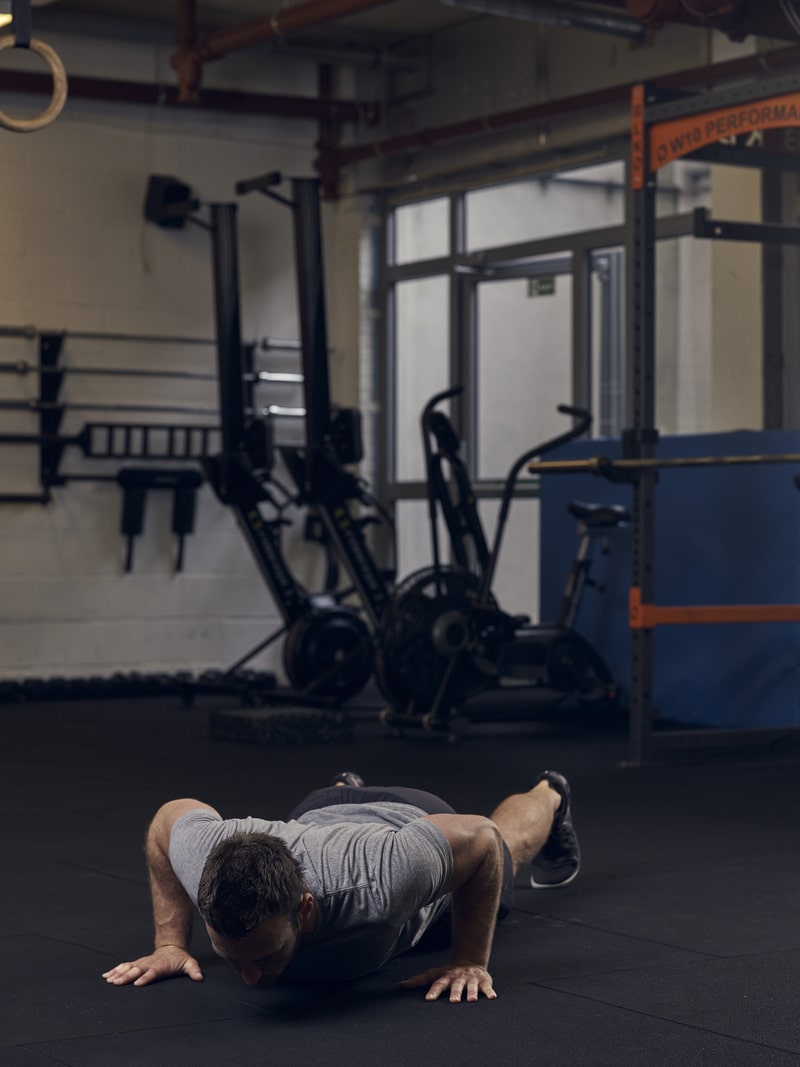
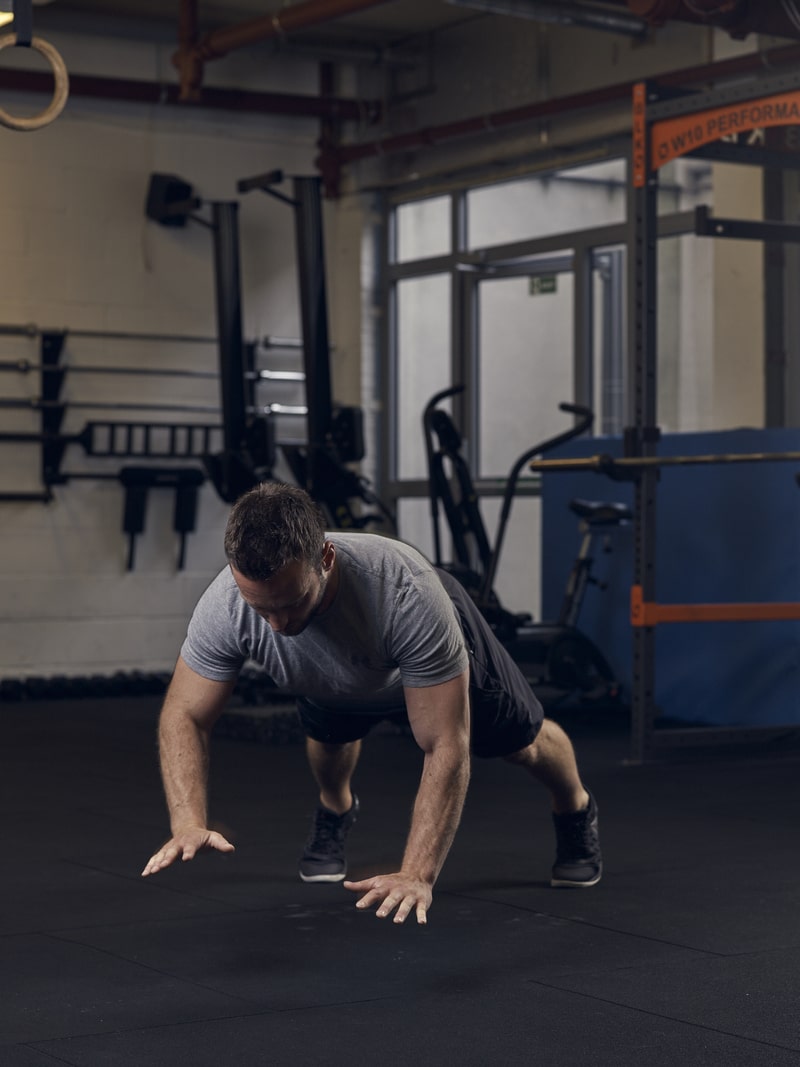
Ballistic press-up
Primary muscles: Chest, triceps
Benefits of ballistic press-ups: By focusing on explosiveness you’ll target your body’s fast-twitch muscle fibres, which is good news whether you’re planning to throw punches or rugby balls. Either do sets of this move on its own, or superset it with normal press-ups to take advantage of the fact that you’re firing on all fibres.
Start in a press-up position and descend into the move quickly, then explode upwards so your hands leave the floor.
Catch yourself softly on your hands before dropping into the next rep.
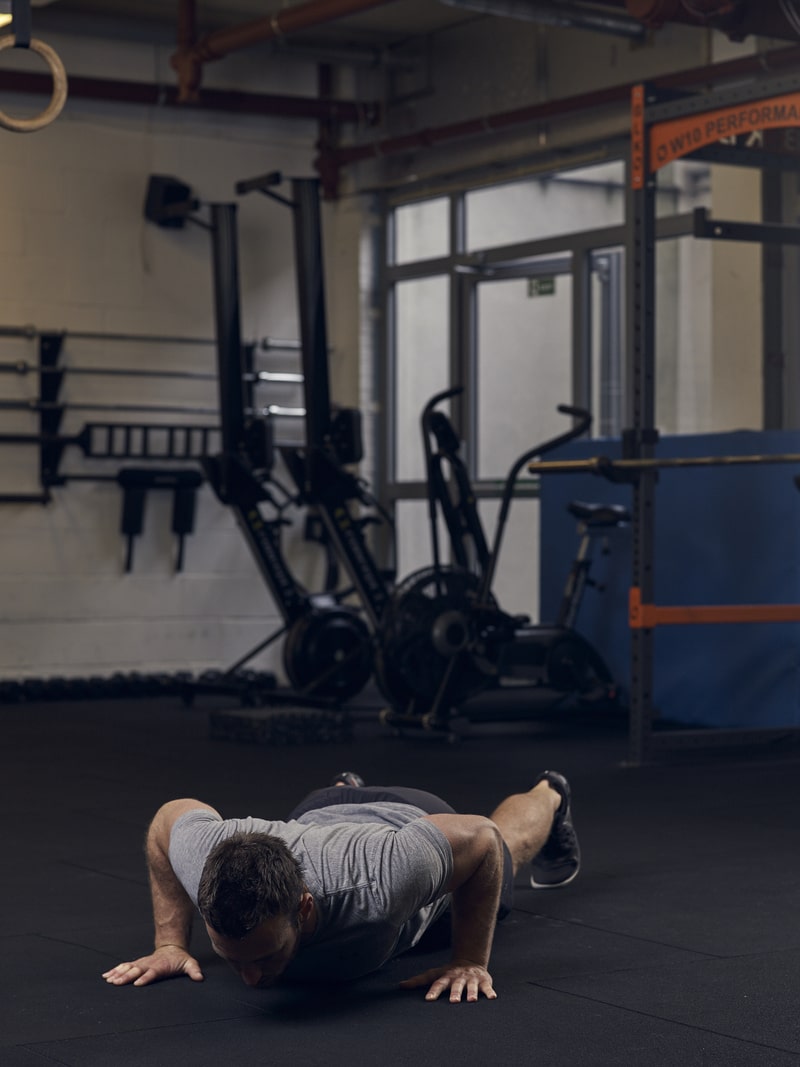
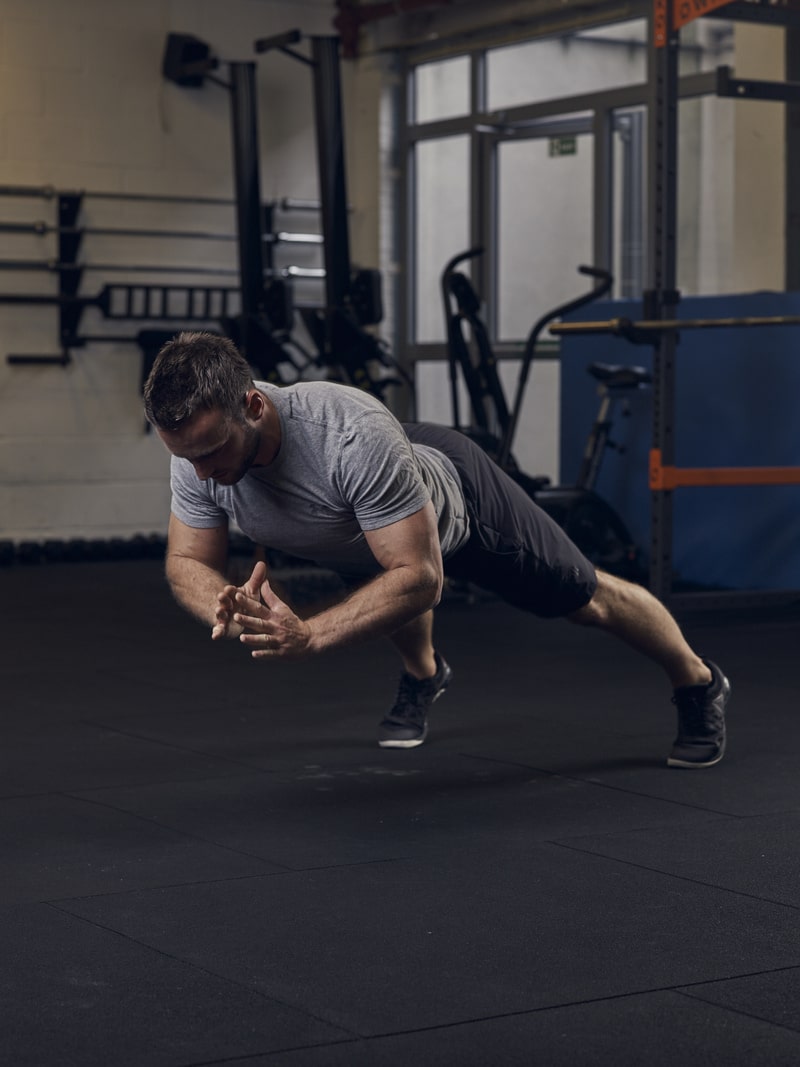
Clapping press-up
Primary muscles: Chest, triceps
Benefits of clapping press-ups: This move adds a clap to the ballistic press-up, forcing you to add height to each rep. It’ll also build coordination. Feeling confident? Add a second clap.
- Start in a press-up position and descend into the move quickly, then explode upwards so your hands leave the floor.
- Clap, then catch yourself softly on your hands.
- Reset between reps to get more height.
Lower-body bodyweight exercises
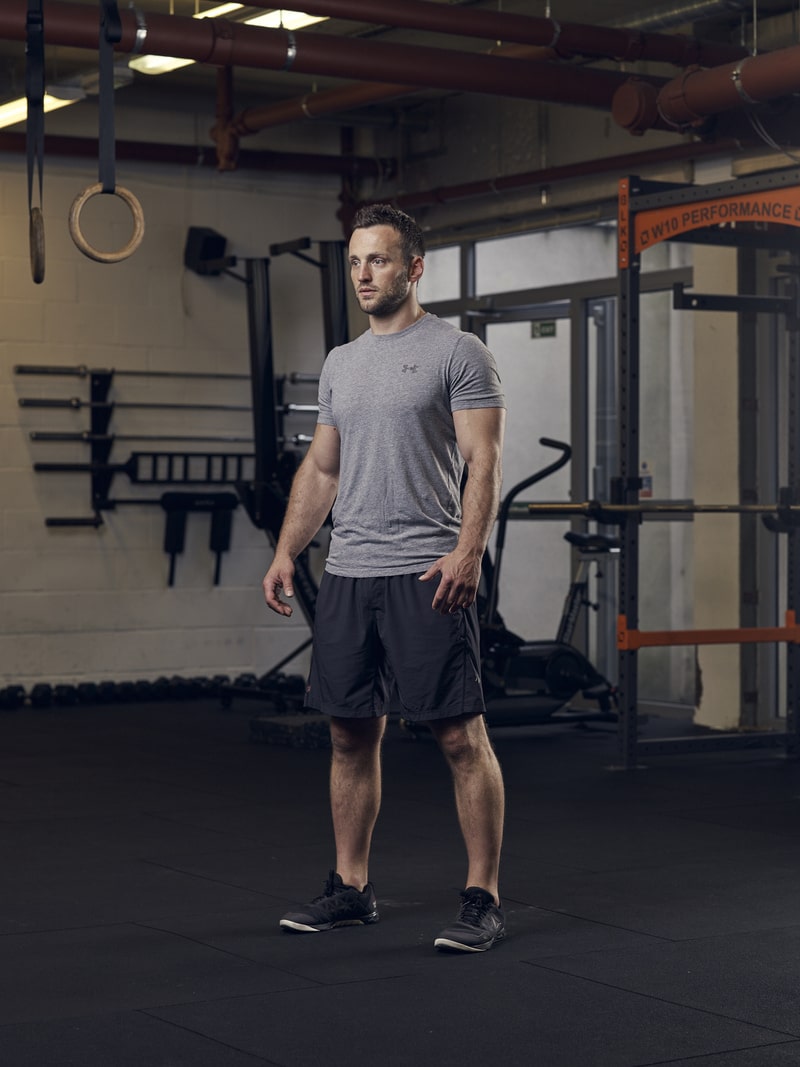
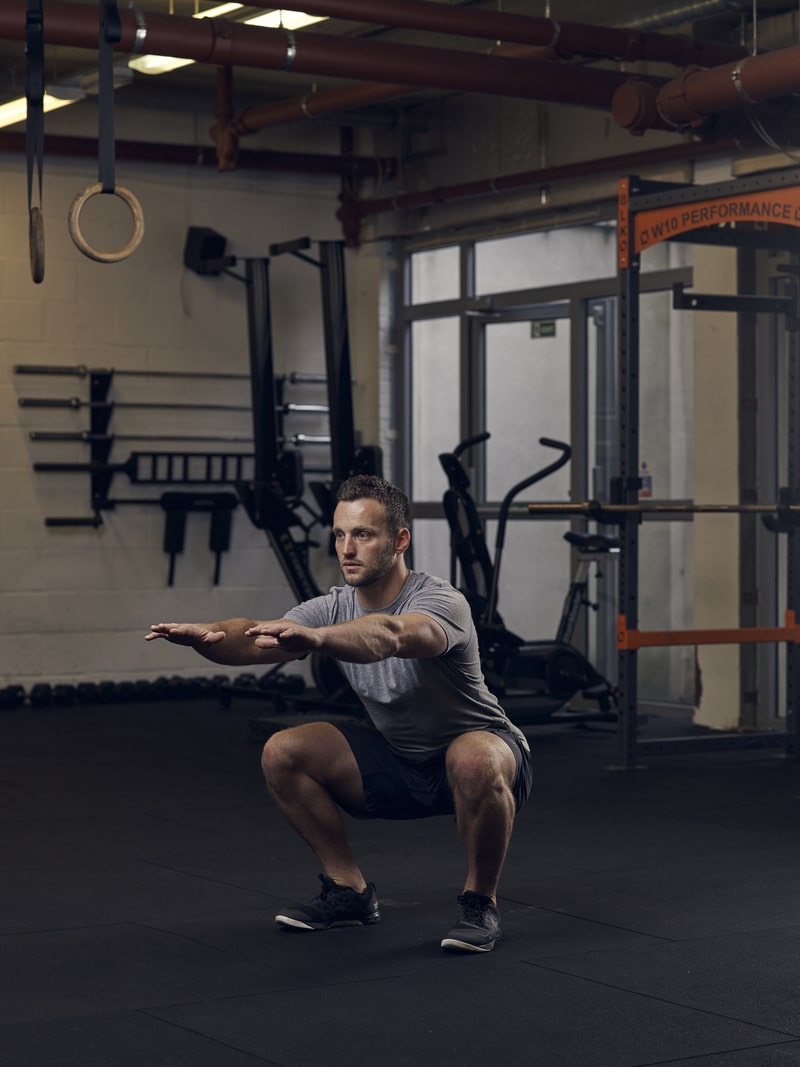
Air squat
Primary muscles: Quads, glutes
Benefits of the air squat: One of the most fundamental human movements, the squat works every muscle in your legs, making it ideal whether you’re getting stronger for a marathon or trying to burn fat. It’s one of the first moves you should learn.
- Start with your feet just wider than shoulder-width apart with your toes pointing outwards slightly.
- Squat down until your thighs are at least parallel to the floor, keeping your chest up.
- Drive back up through your heels.
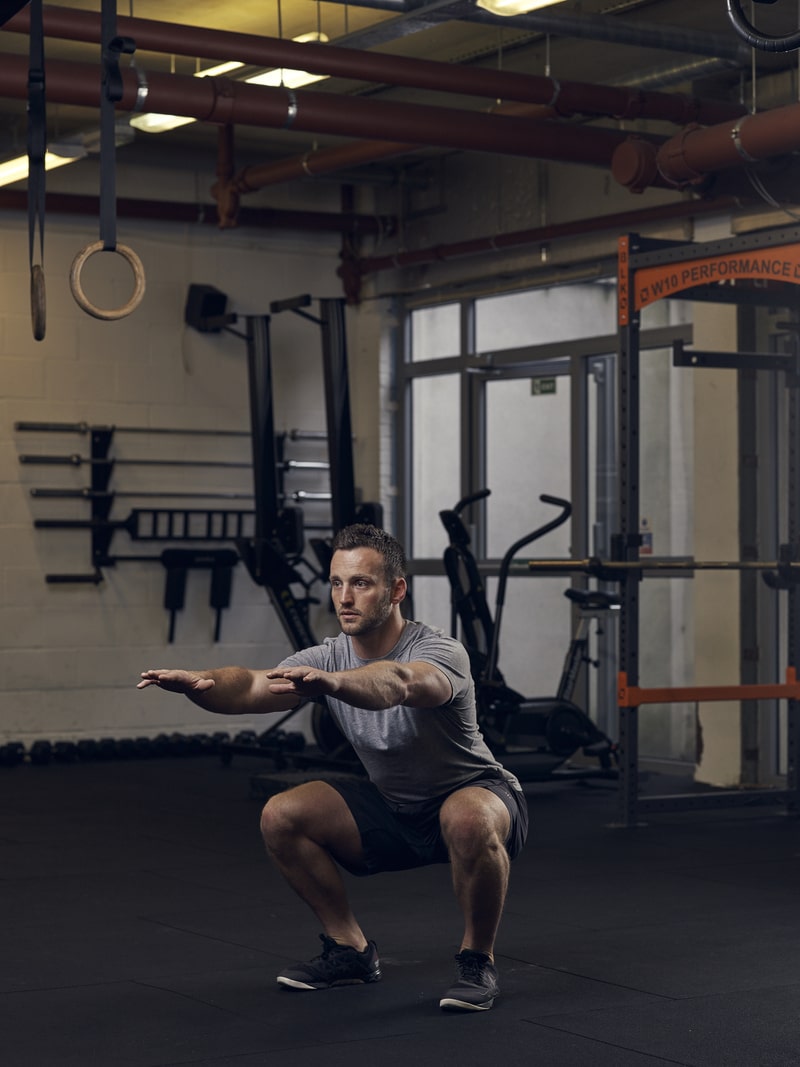
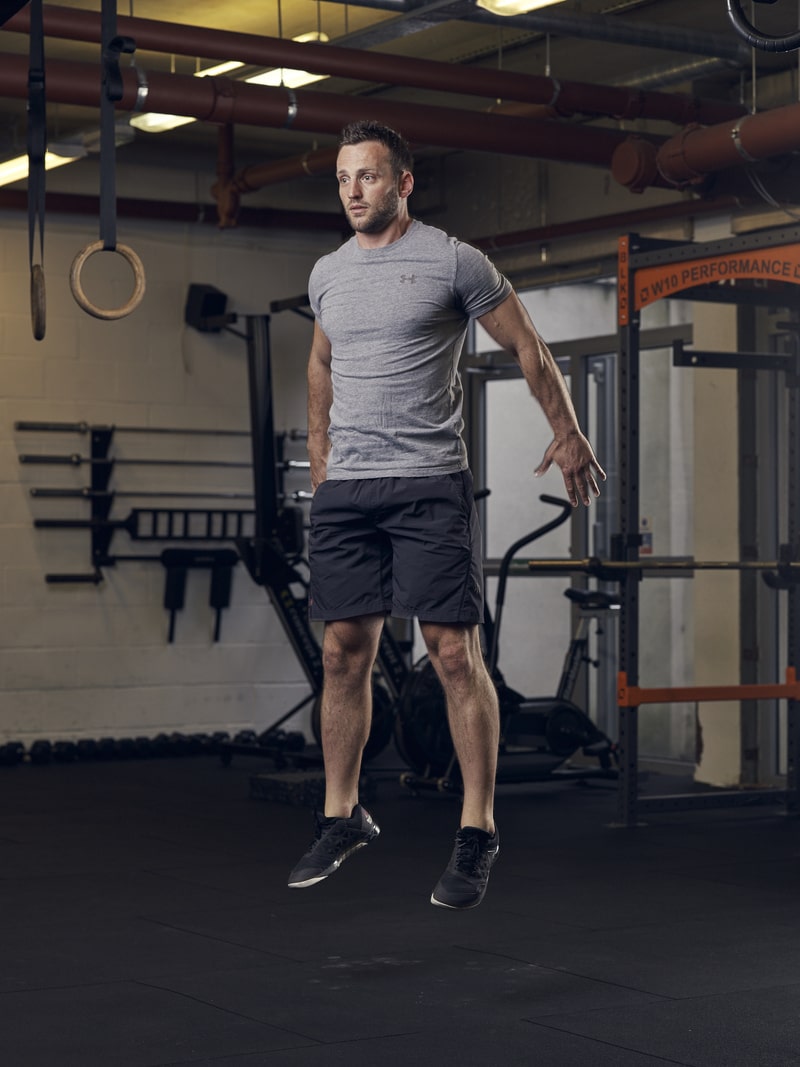
Jump squat
Primary muscles: Quads, glutes
Benefits of the jump squat: By focusing on explosiveness you’ll target your body’s fast-twitch fibres, helping you to burn fat or sink three-pointers. Use these alone, or superset them with squats and lunges to fire up your muscles before the bigger moves.
- Follow the same movement as the squat, then explode off the floor from the bottom of the rep.
- Get as high as you can, and reset between each rep to make sure you’re getting as much airtime as possible.
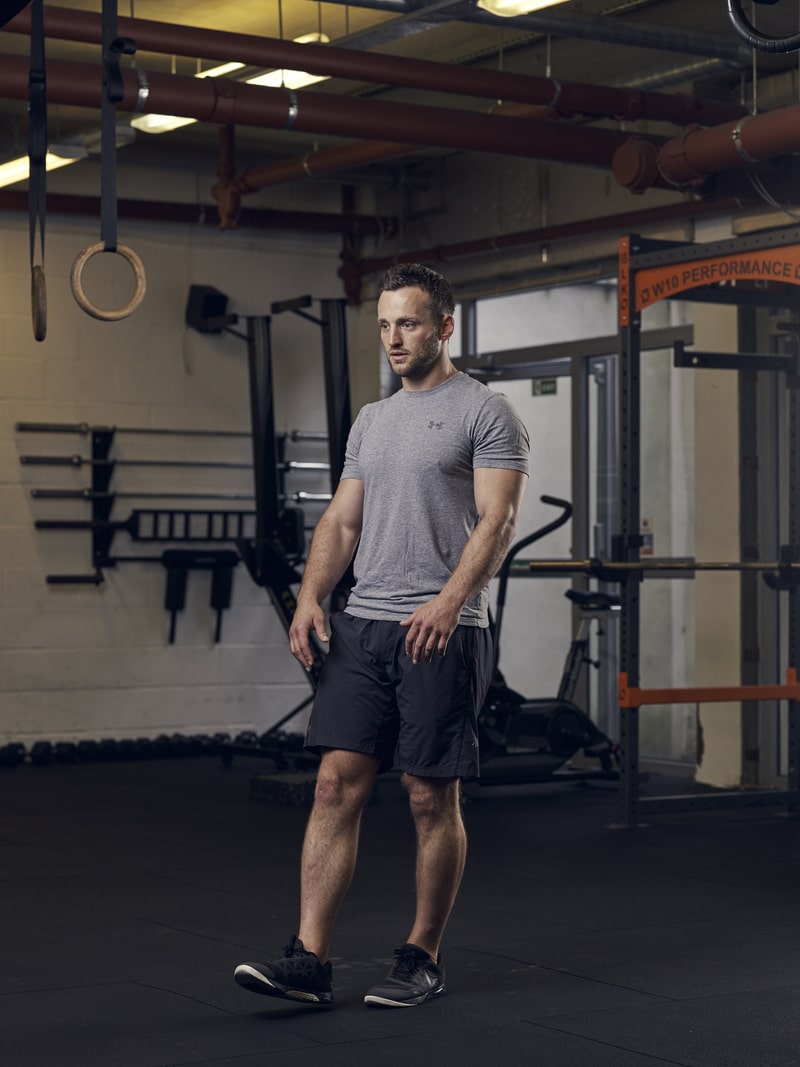
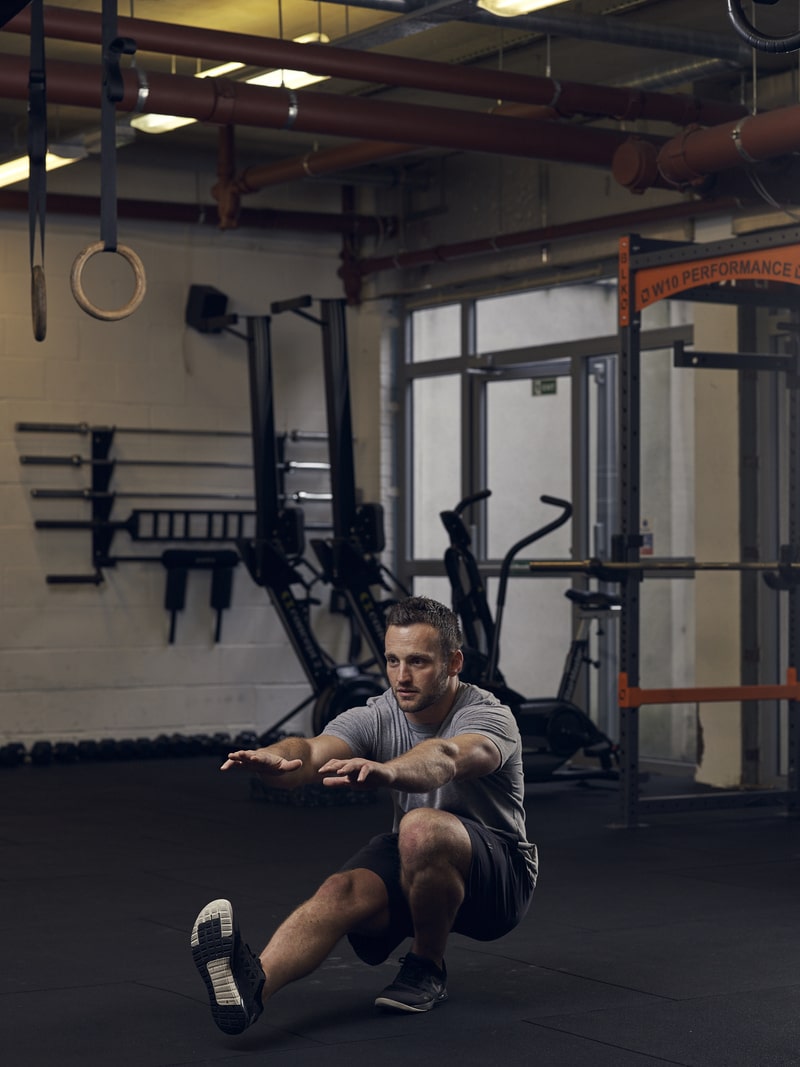
Pistol squat
Primary muscles: Quads, glutes
Benefits of the pistol squat: Because you’re putting all your bodyweight on one leg, the pistol is one of the best pure strength-building moves you can do for your lower body with just bodyweight. It’s incredibly tough, but if you can master it you’ll know you’re both strong and mobile.
- Stand on one leg with your arms out in front of you and your non-standing leg straight, with the foot hovering just off the floor.
- Start the squat by sitting back and downwards as if going into a chair.
- Get stable at the bottom, drive your foot hard into the floor and try to crack an imaginary walnut between your glutes on the way up.
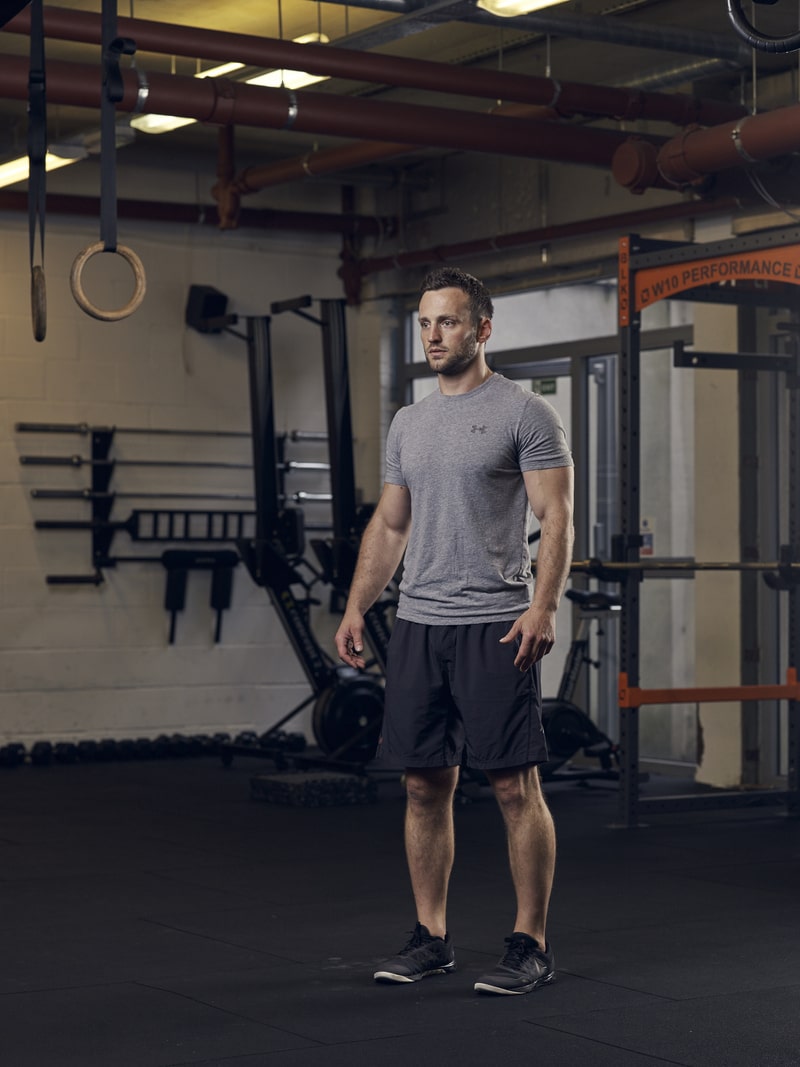
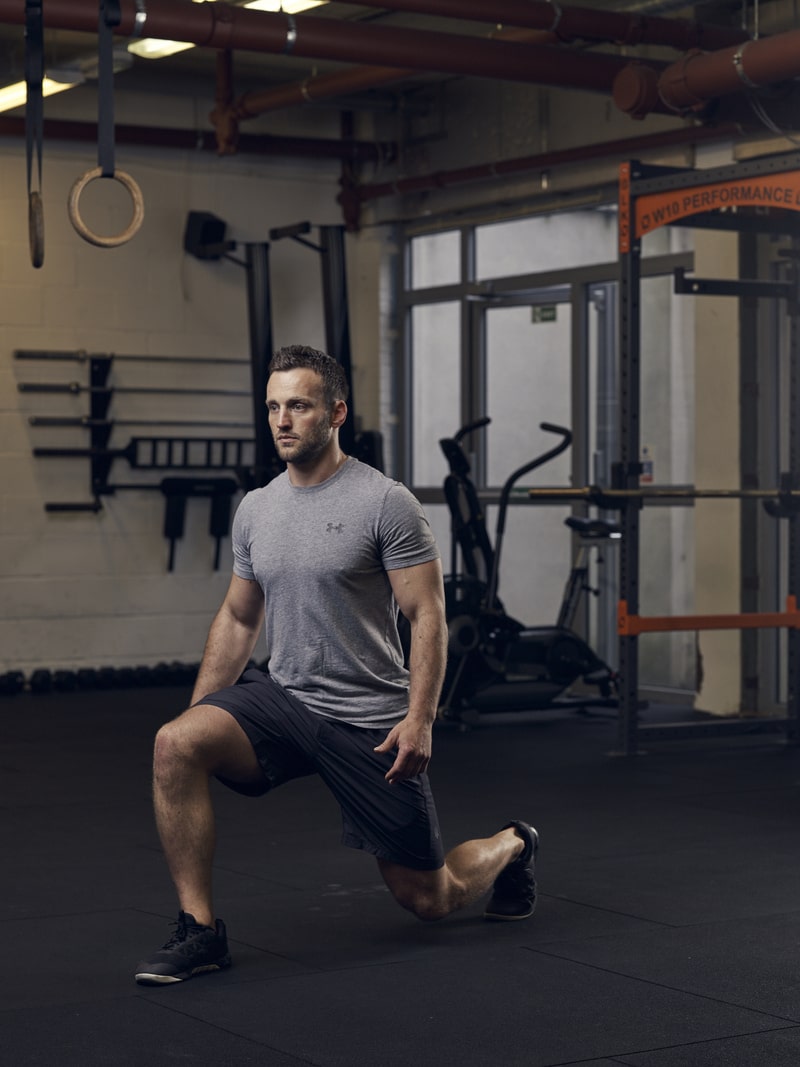
Lunge
Primary muscles: Quads, glutes, hamstrings
Benefits of the lunge: Though the squat is arguably the best lower-body builder, using squats in conjunction with lunges is even better because it will keep your lower body in balance, ensuring one side of your body doesn’t get stronger than the other. Building unilateral strength with lunges is also good for everything from sprints to five-a-side.
- From a standing start, take a big step forward into a lunge, keeping your front knee in line with your toes and making sure it doesn’t go past them.
- Return to the start position, then repeat on the other leg.
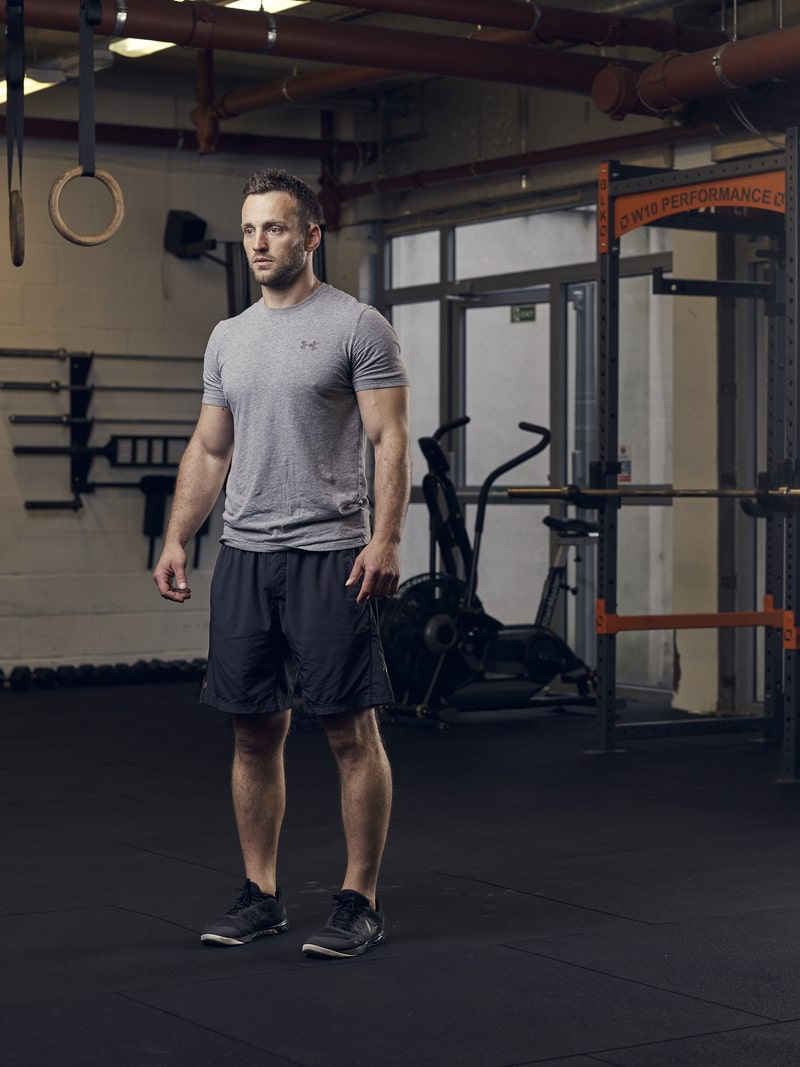
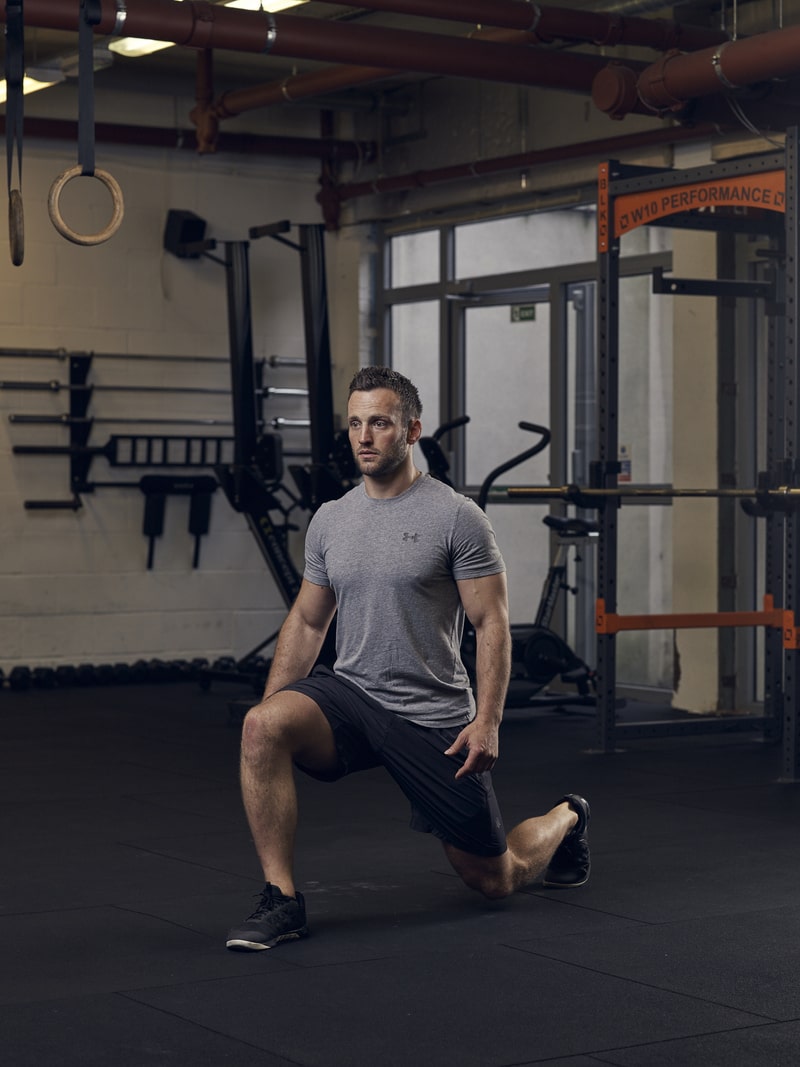
Reverse lunge
Primary muscles: Quads, glutes, hamstrings
Benefits of the reverse lunge: Apart from providing a different stimulus to your legs, reverse lunges are easier to do well when you’re fatigued, making them safer than regular lunges in circuits or supersets.
- From a standing start, take a big step back into a lunge, keeping your front knee in line with your toes and making sure it doesn’t go past them.
- Push off your back leg to return to the start position.
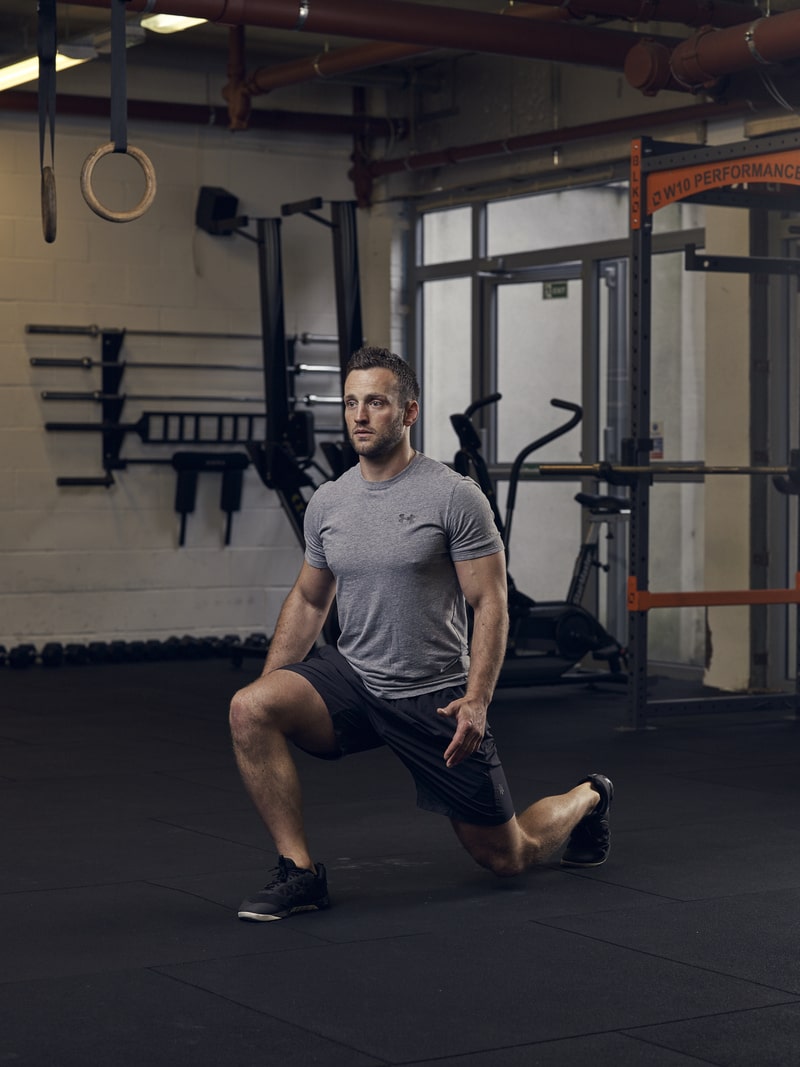
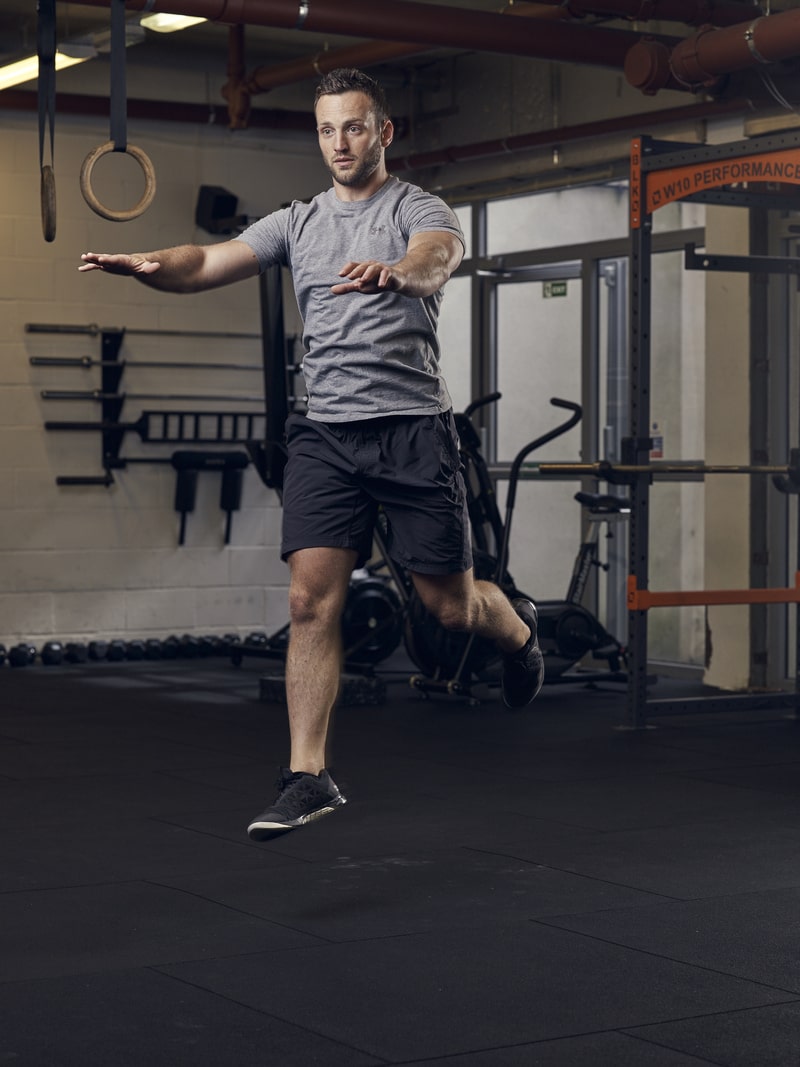
Jump lunge
Primary muscles: Quads, glutes, hamstrings
Benefits of the jump lunge: Explosive strength off one leg is important in almost every sport. These also work well combined with other leg moves. For a giant set, do squats, lunges, jump squats and jump lunges for 10 reps each.
- Starting from a lunge position, drive up into a jump, switching legs in the air and landing in a lunge on the other side.
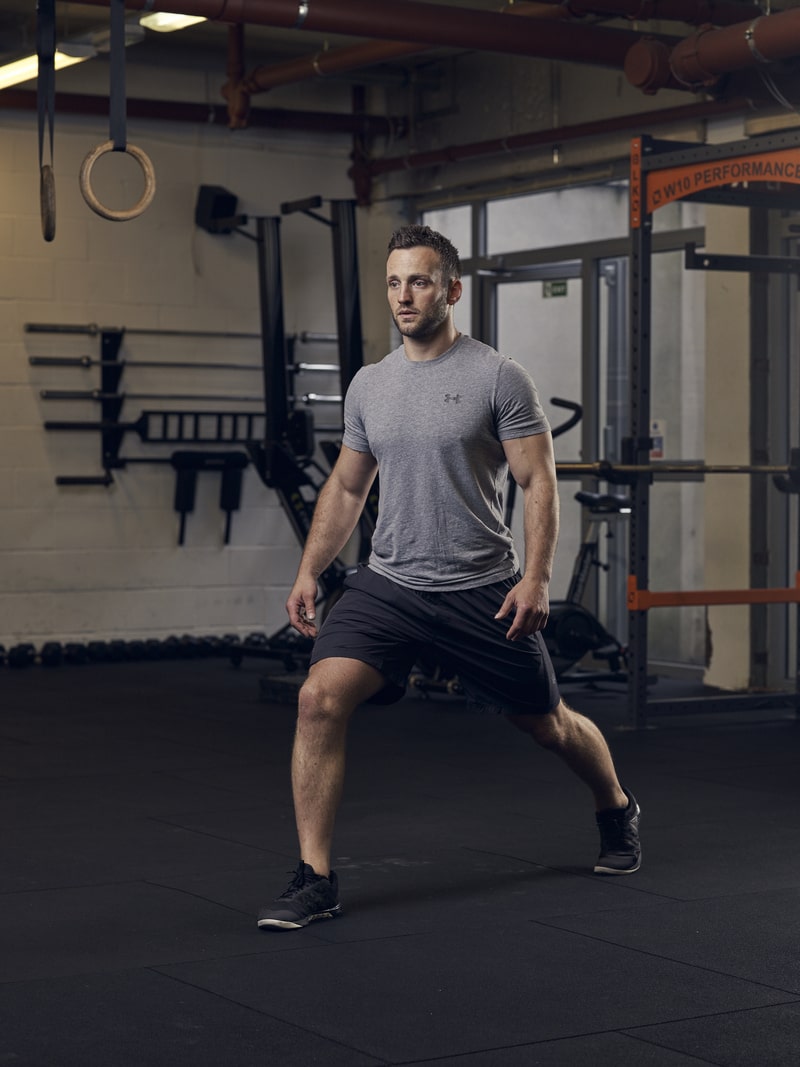
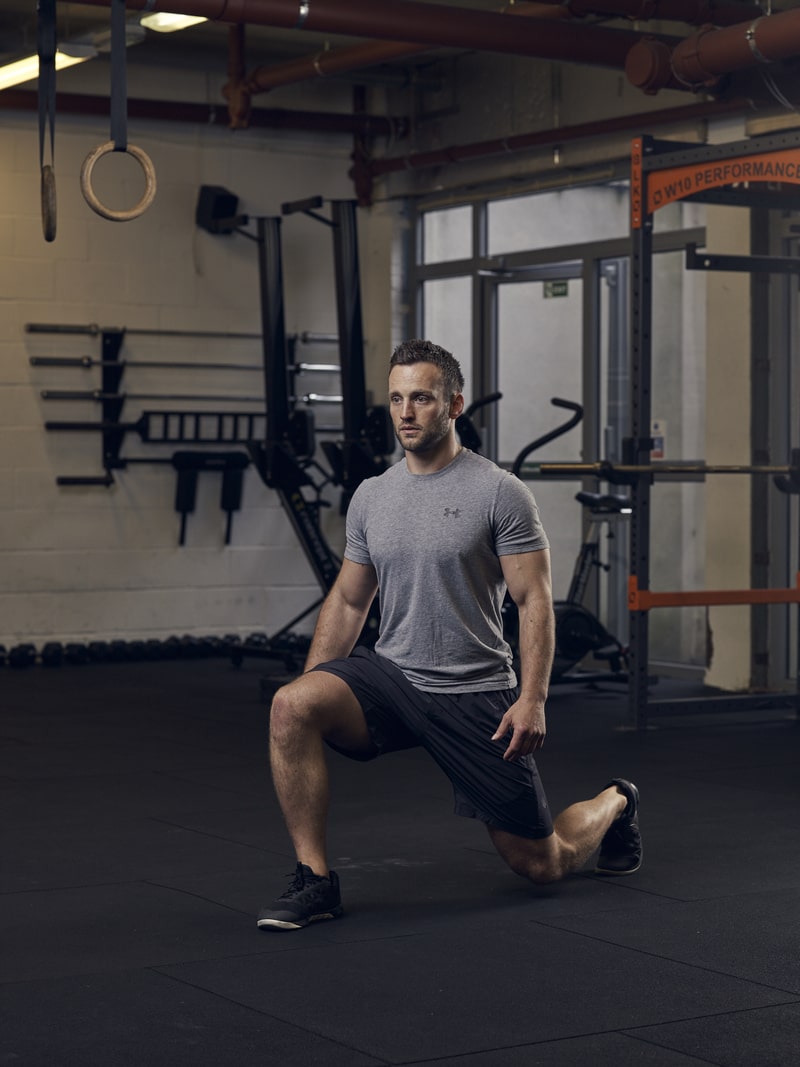
Split squat
Primary muscles: Quads, hamstrings
Benefits of the split squat: Although it’s useful as a beginner move – taking some of the coordination aspects out of a lunge – the split squat can also increase the time under tension on the legs, making it a solid leg-builder. Don’t extend your leg all the way up on each rep.
- Starting in a split stance (with one foot in front of the other), bend your front leg until your trailing knee brushes the floor.
- Then simply straighten your front leg again without moving your feet to complete the rep.
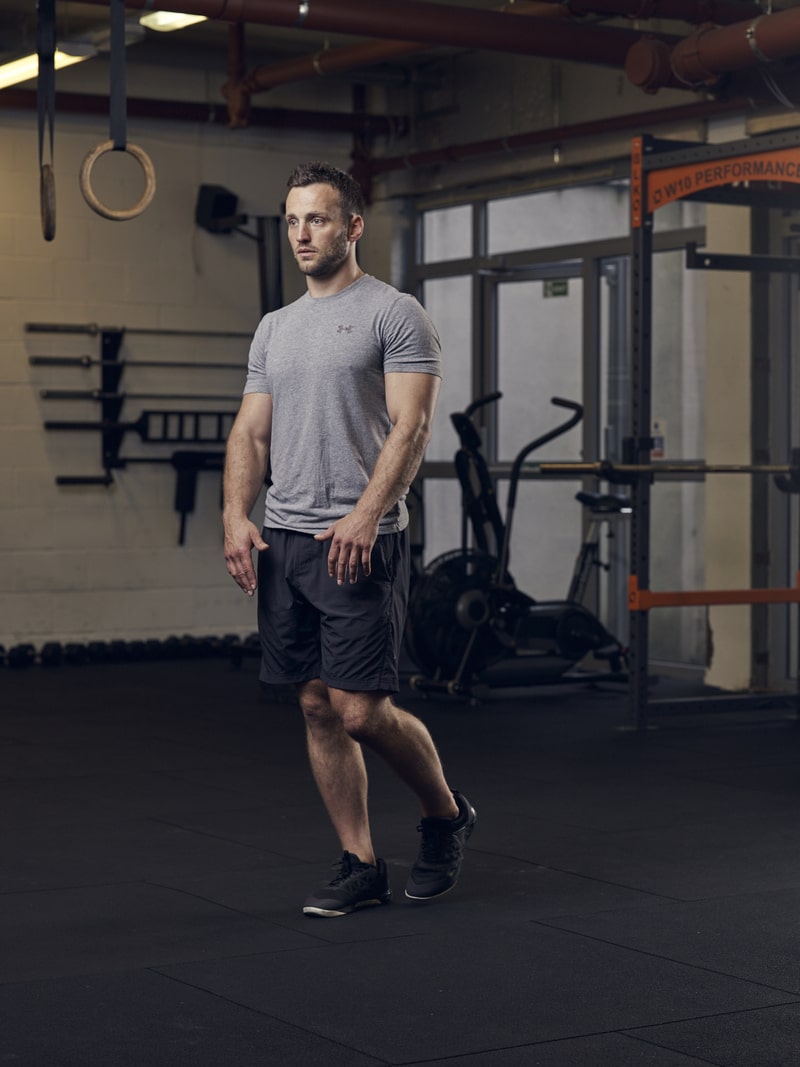
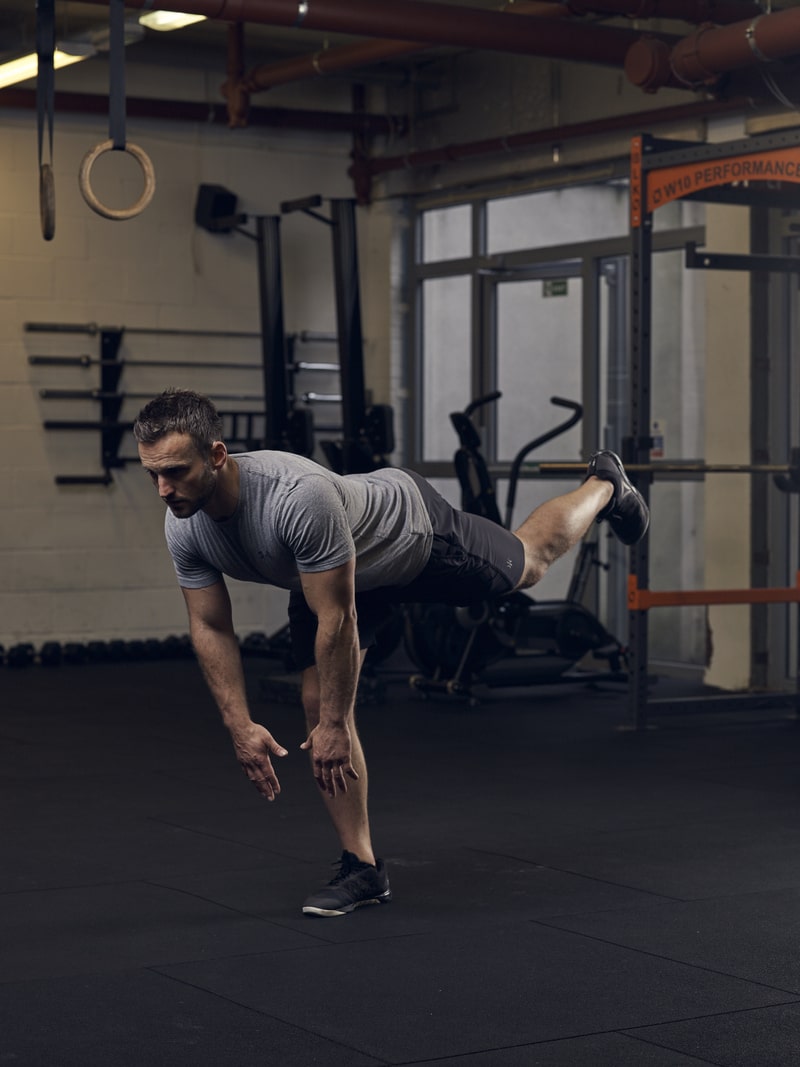
Single-leg Romanian deadlift
Primary muscles: Hamstrings, glutes
Benefits of the single-leg Romanian deadlift: By challenging your balance, and providing a stretch to your hamstrings, the single-leg RDL provides a perfect introduction to more advanced moves – or an ideal warm-up before doing deadlifts.
- Stand tall with one foot off the floor and your other leg slightly bent.
- Keeping your upper back straight, bend forwards at the hips until you feel a stretch in your hamstrings.
- Pause, then straighten up.
Bodyweight abs exercises
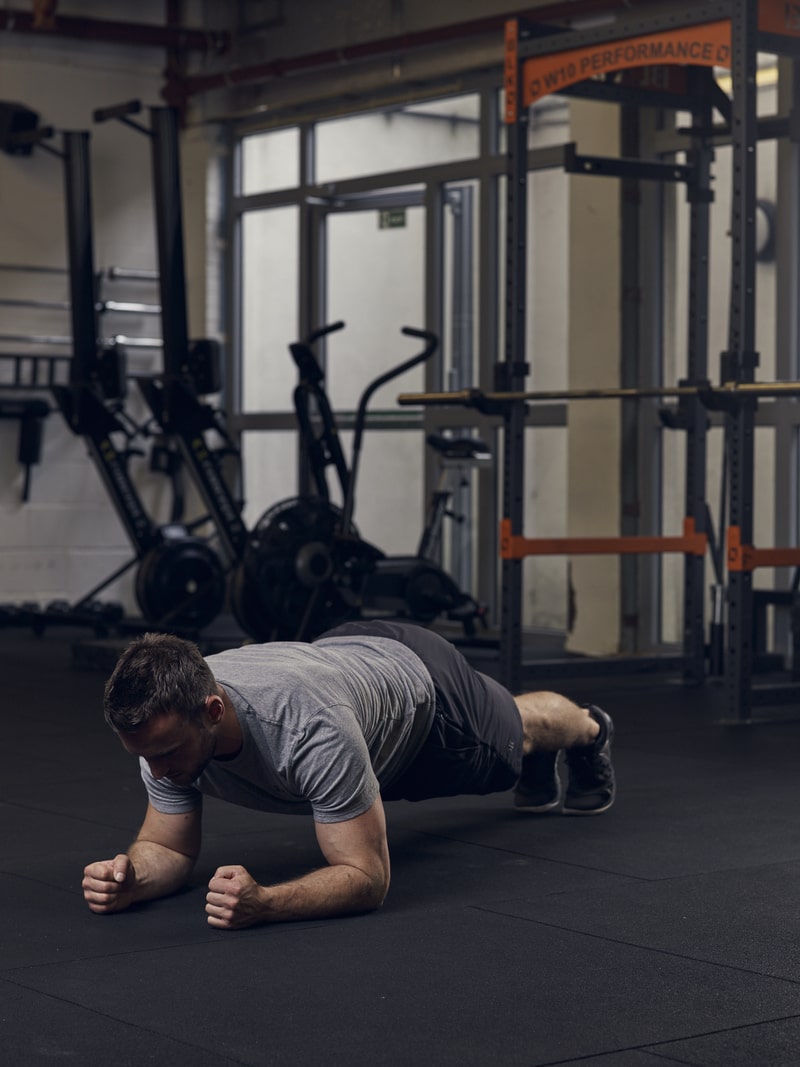
Plank
Primary muscles: Core
Benefits of planks: Your core muscles enable you to keep your body stable and straight, and the plank teaches them to maintain tension while improving your posture and working your abs. You should be able to hold this move for two minutes before doing more advanced abs training.
- Get into a press-up position but with your elbows and forearms on the floor and feet close together, keeping your body completely straight.
- Hold the position.
- To make the move tougher, move your elbows forward and together.
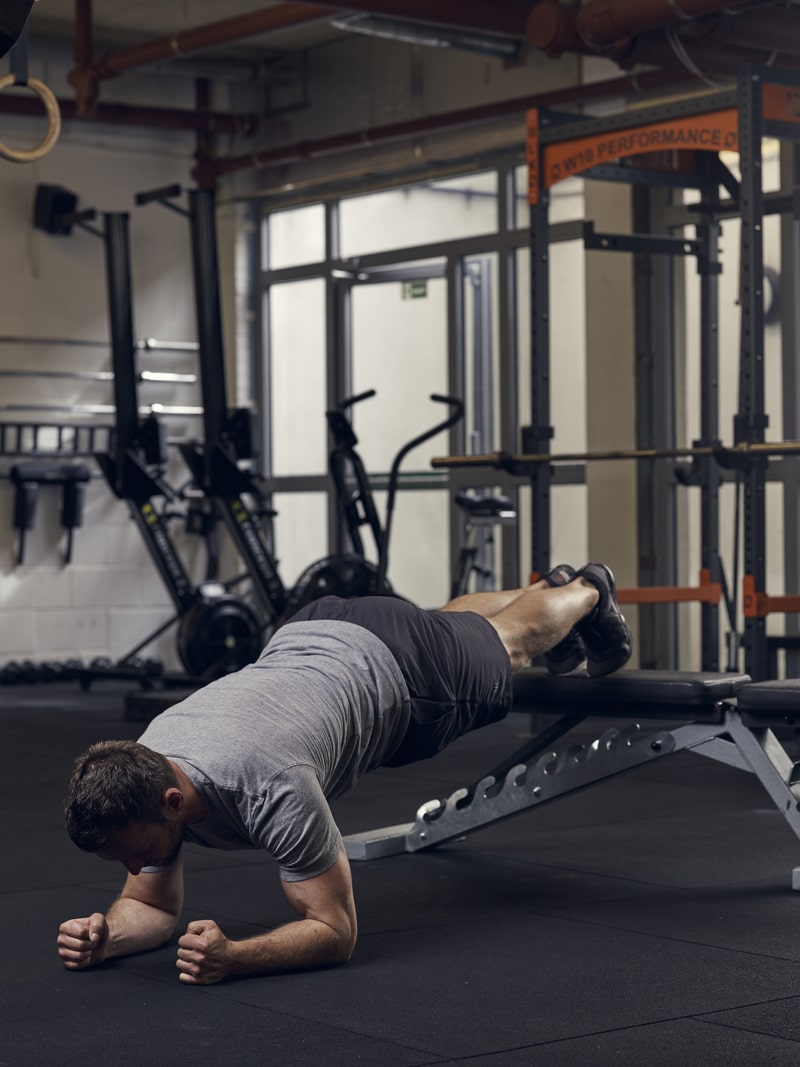
Decline plank
Primary muscles: Core
Benefits of decline planks: By changing the elevation of your feet you’ll put more training stress on your shoulders and change the angle your abs are working at, making the move tougher. For an even tougher variation, do it with your feet in suspension trainer straps.
- Get into a press-up position with your forearms on the floor and feet on a box, bench or sofa, keeping your body completely straight.
- To make the move tougher, move your elbows forward and together.
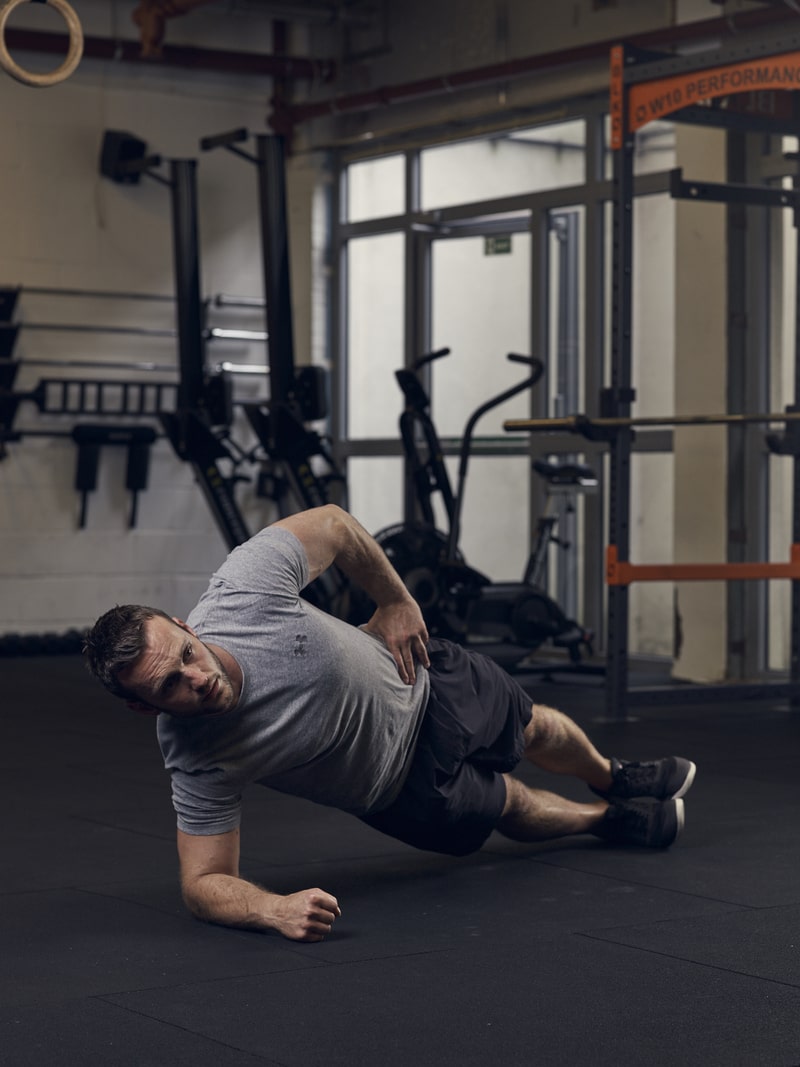
Side plank
Primary muscles: Obliques
Benefits of side planks: Shifting onto one side hits your obliques harder than the traditional plank. Put them together into a superset: 30 seconds of plank, 30 seconds on one side, 30 more seconds of plank, and a final 30 seconds on the other side.
- Get onto one forearm with your feet stacked one on top of the other – or both on the floor, one behind the other if that’s too hard.
- Keep your body in a straight line.
- Once you start to sag, the set’s over.
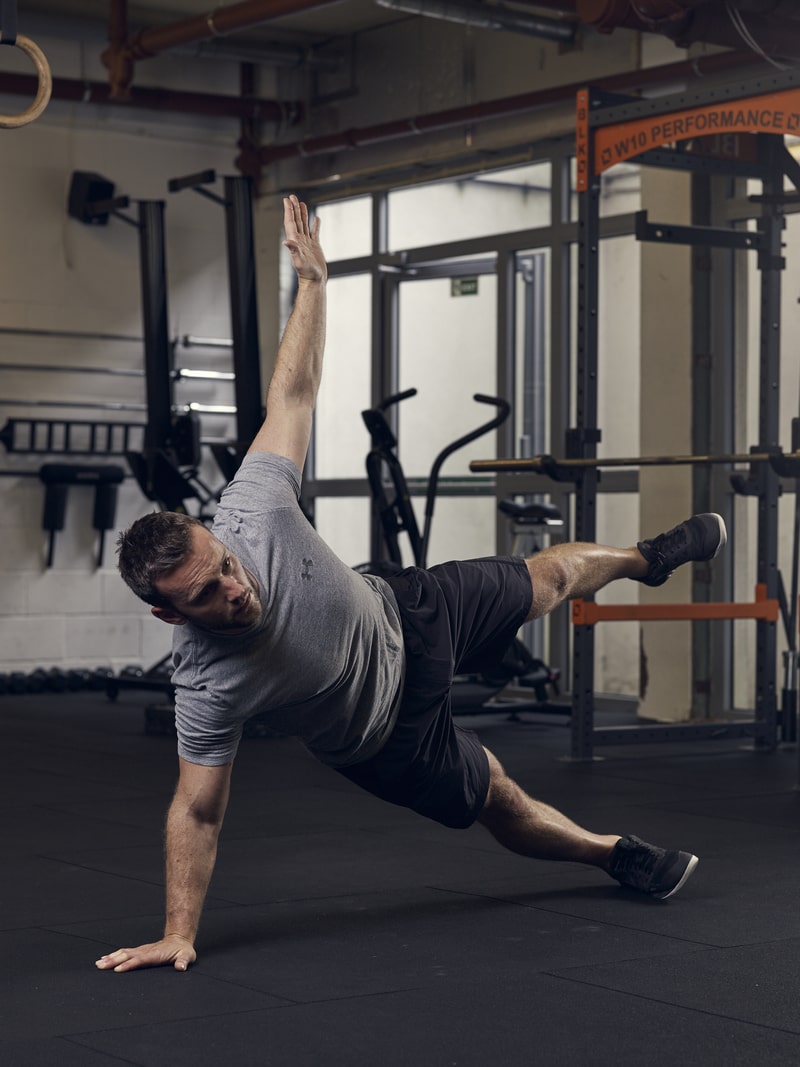
Side plank star
Primary muscles: Obliques, shoulders
Benefits of the side plank star: This variation of the side plank – popular with yogis – demands more coordination and balance than the standard position, and it’s more challenging.
- Lie in a side plank position on one hand, feet stacked.
- Raise your leg and arm and hold, then repeat on the other side.
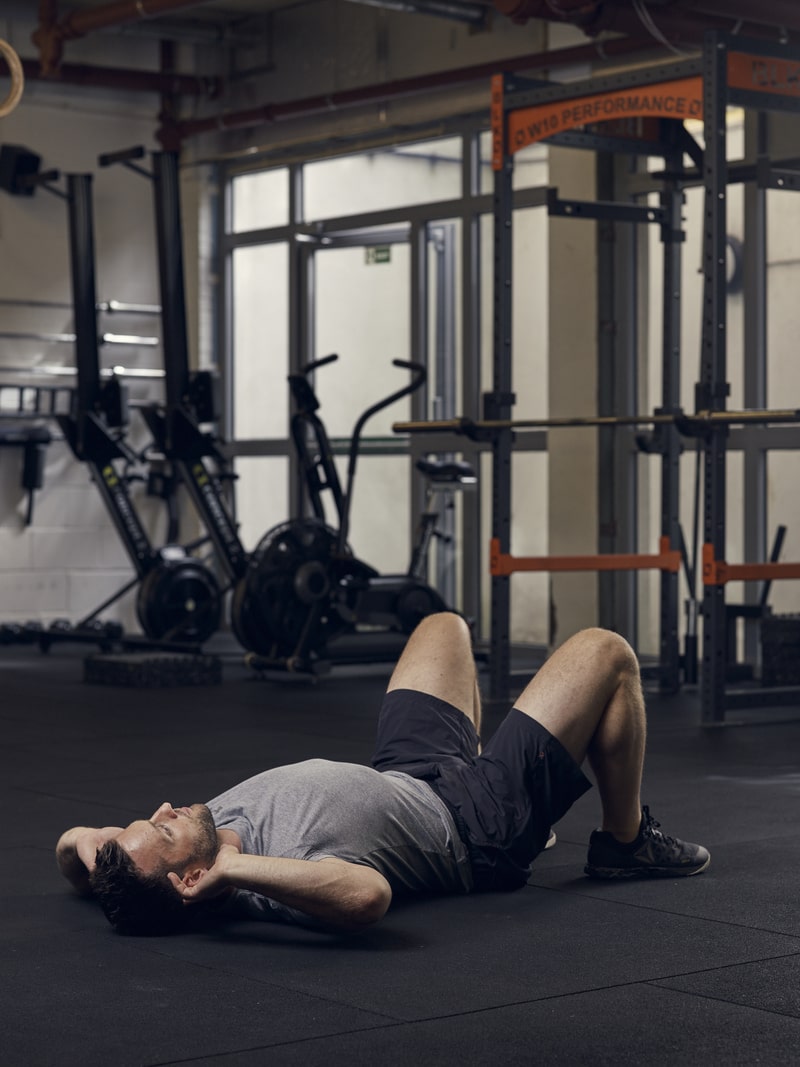
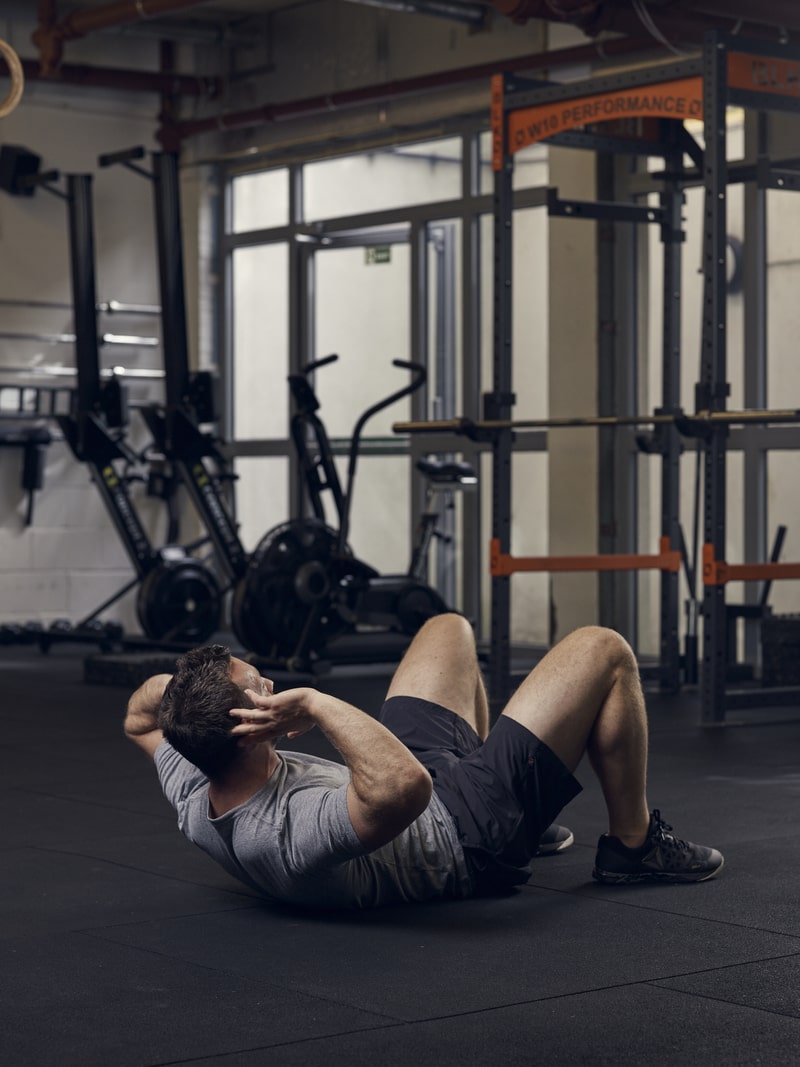
Crunch
Primary muscles: Upper abs
Benefits of crunches: By keeping things more slow and controlled than the traditional sit-up, the crunch targets the core rather than hip flexors, while minimising stress on your lower back. It’s gone out of fashion, but still has a place in your routine.
- Lie flat on your back with knees bent and hands either across your chest on touching your temples.
- Contract your abs to lift your shoulders and curl your chest towards your knees.
- Pause at the top of the move and squeeze your abs, then lower slowly to the start.
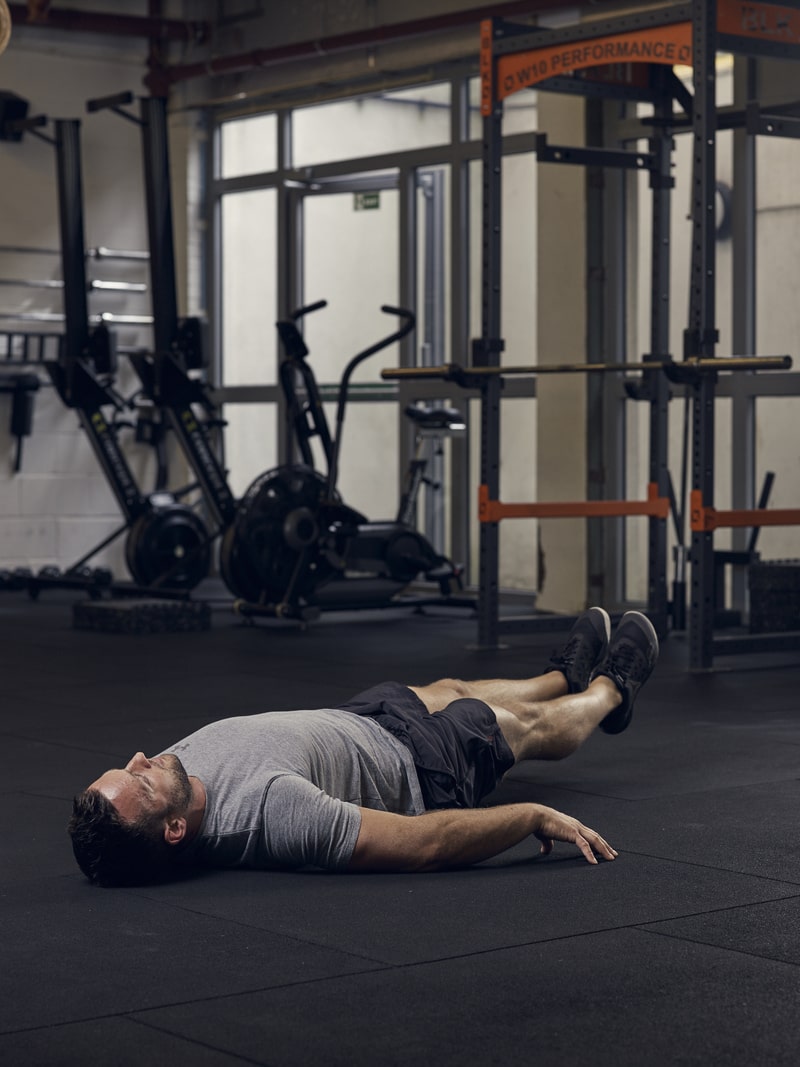
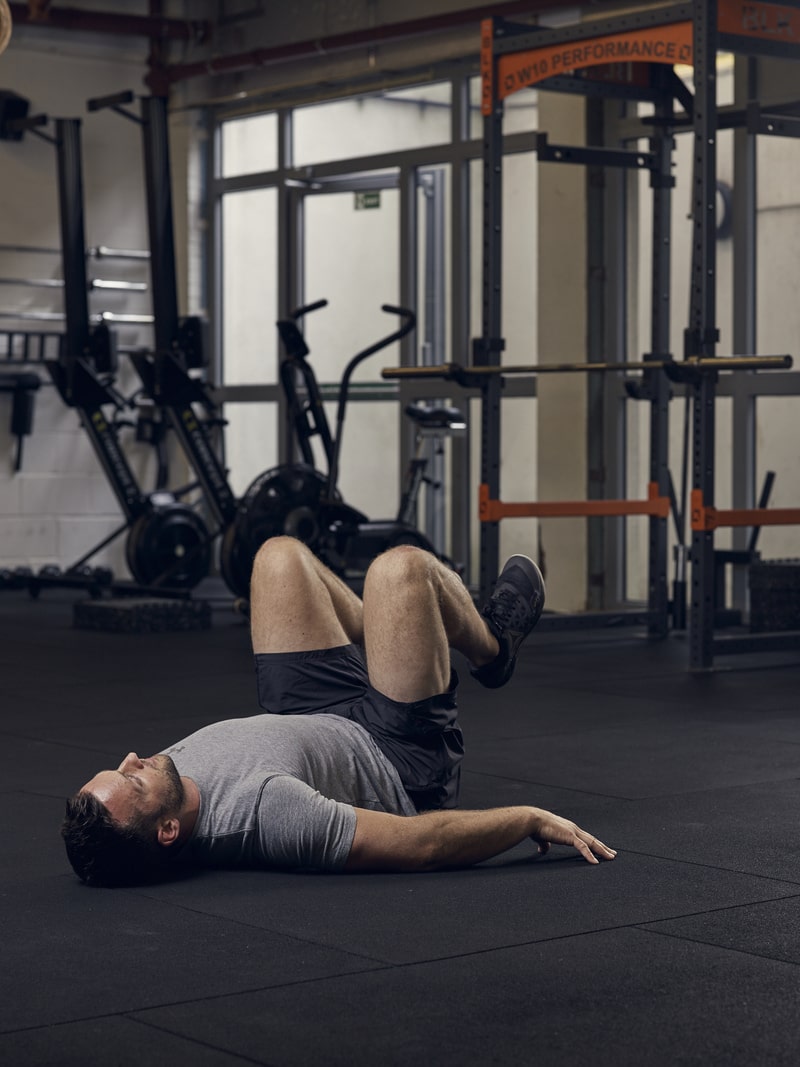
Reverse crunch
Primary muscles: Lower abs
Benefits of reverse crunches: Without a pull-up bar, the reverse crunch is one of the few moves that targets the lower abs. Use it together with the standard crunch for an abs double whammy.
- Lie flat on your back with knees bent and arms flat against the floor.
- Contract your lower abs to draw your knees in towards your chest.
- Pause at the top of the move and squeeze your abs, then return to the start.
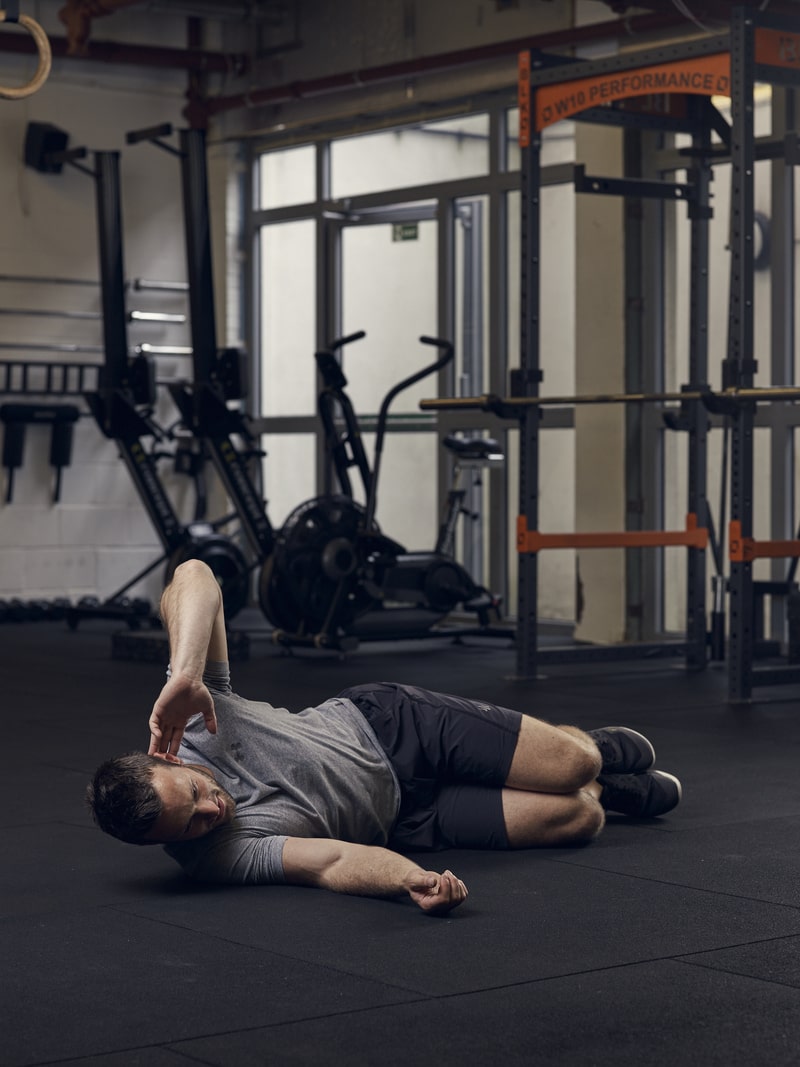
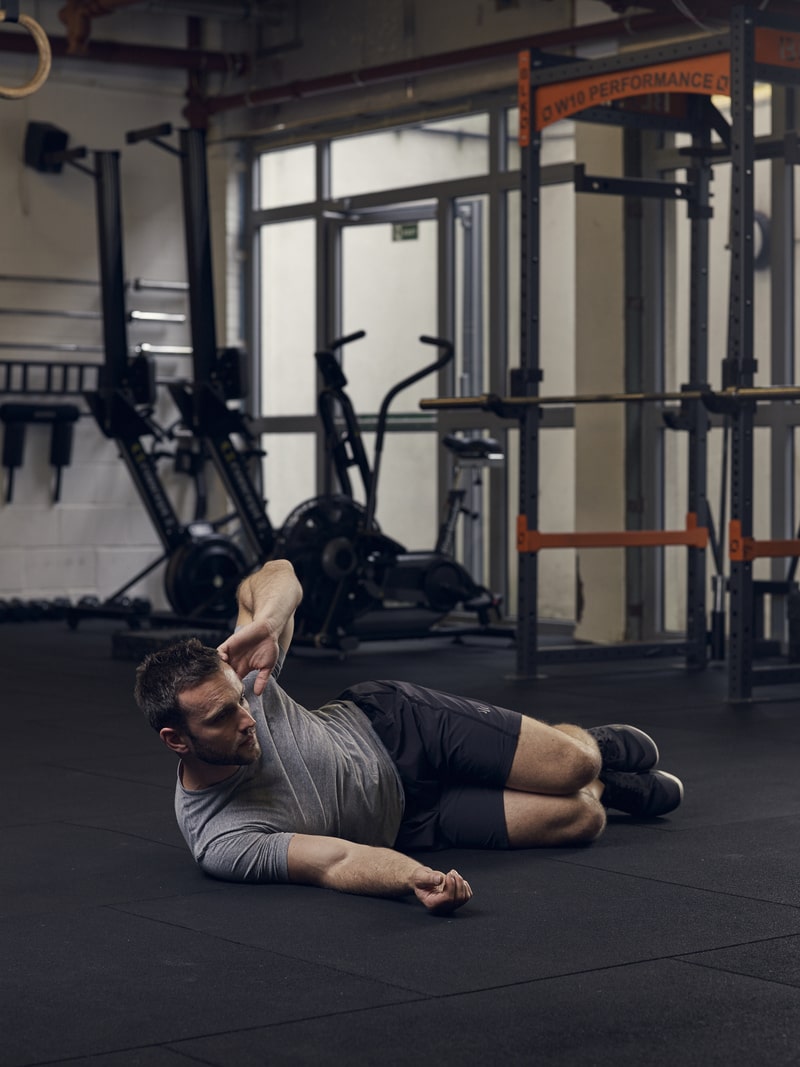
Side crunch
Primary muscles: Obliques
Benefits of side crunches: This move works your abs and obliques in one motion, while building the twisting strength that helps in numerous sports.
- Lie on the floor on your side with your knees bent.
- With one hand by the side of your head, flex your abs and bring your shoulders off the floor, towards your knees.
- Pause, then lower.
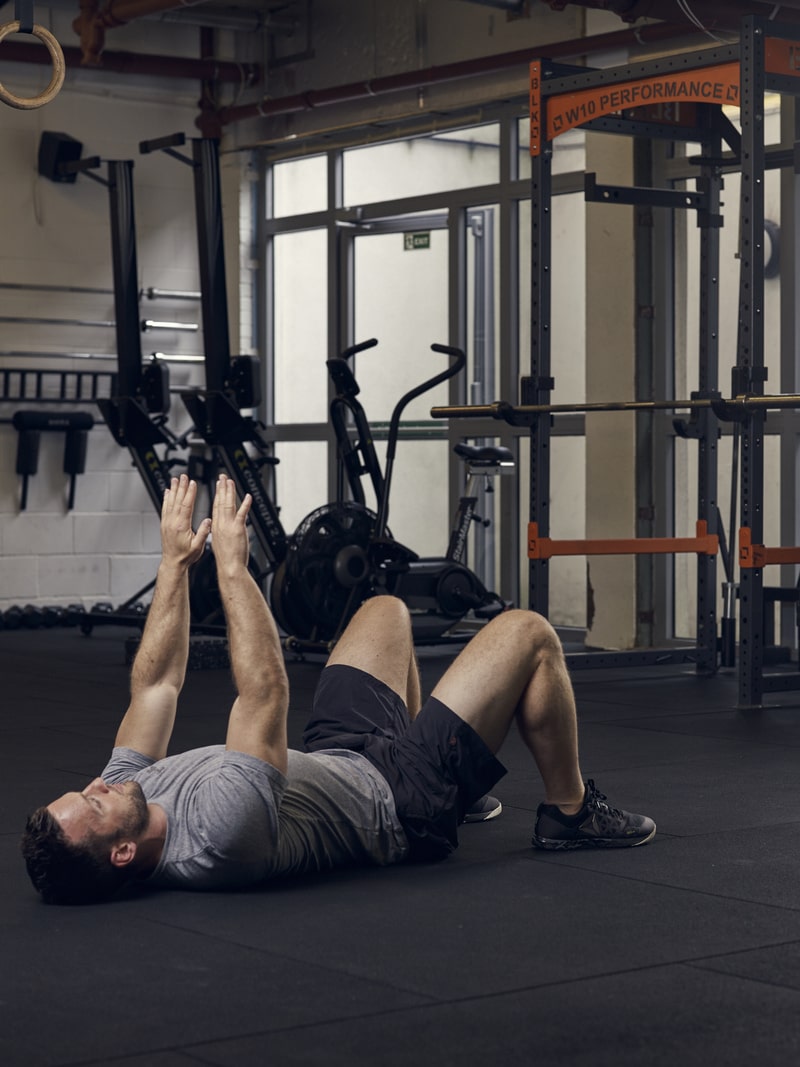
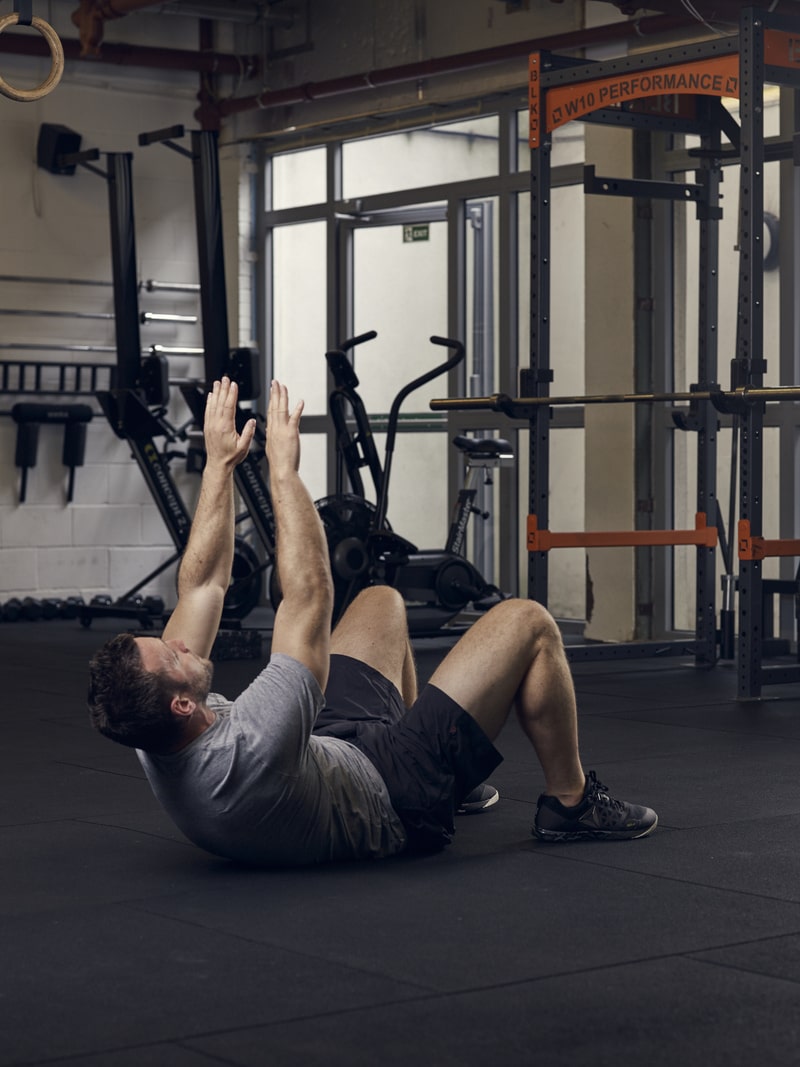
Crunch reach
Primary muscles: Upper abs
Benefits of the crunch reach: This move forces you to keep the form strict, increasing the tension on your abs and the contraction at the top of the move.
- Lie on the floor with your knees slightly bent and your arms raised vertically.
- Lift your upper back off the floor, still reaching straight upwards, pause, then lower.
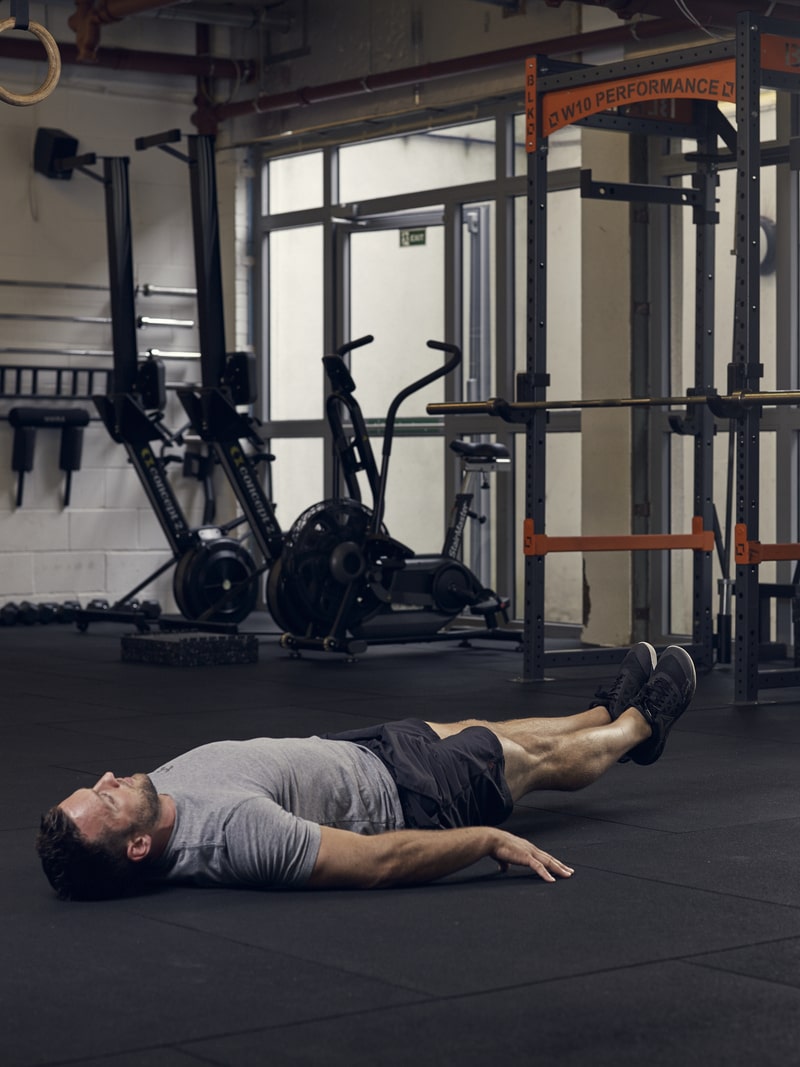
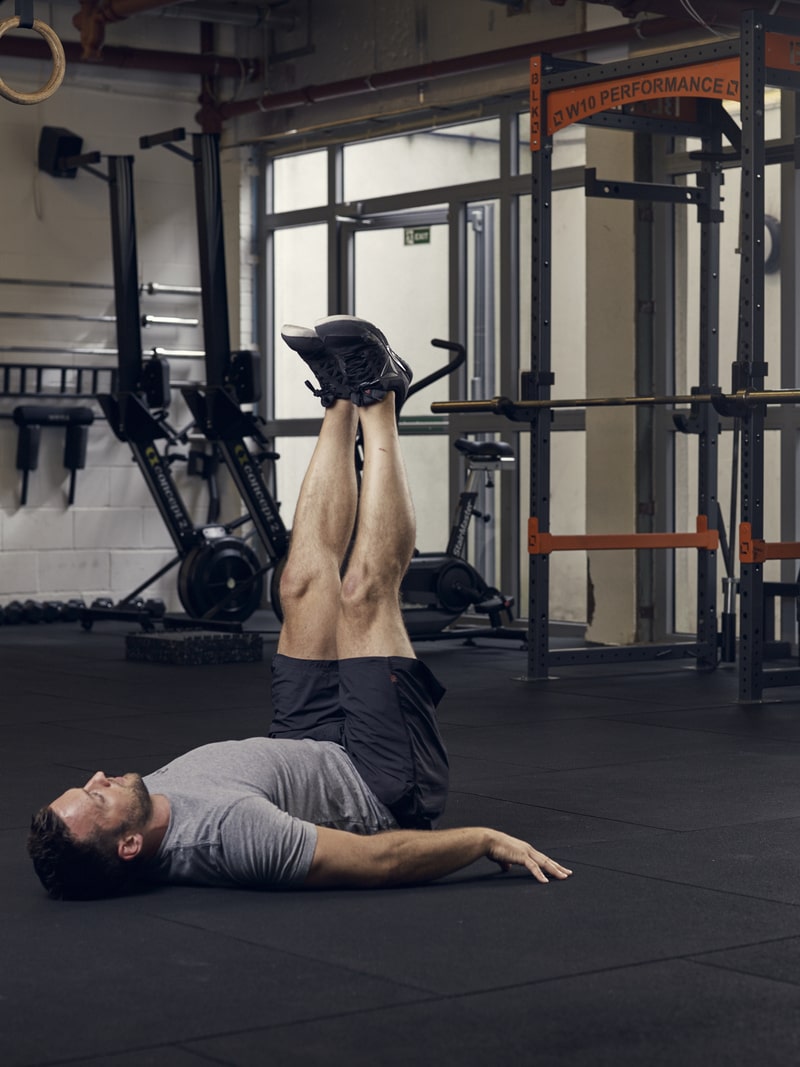
Leg raise
Primary muscles: Lower abs
Benefits of leg raises: One of the few bodyweight moves that targets the lower abs, the leg raise also strengthens the lower back, preventing injury.
- Lie on your back with your legs straight and heels slightly off the floor.
- Bring your legs up to a vertical position, then lower them slowly until they’re just off the floor again.
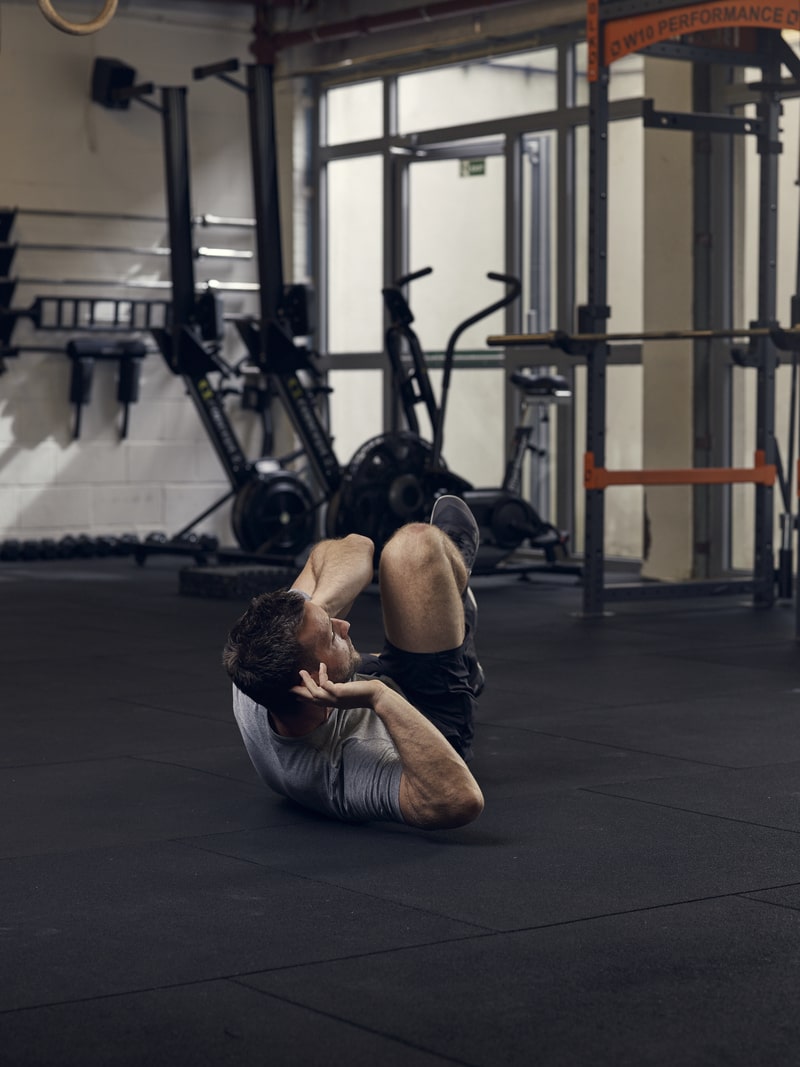
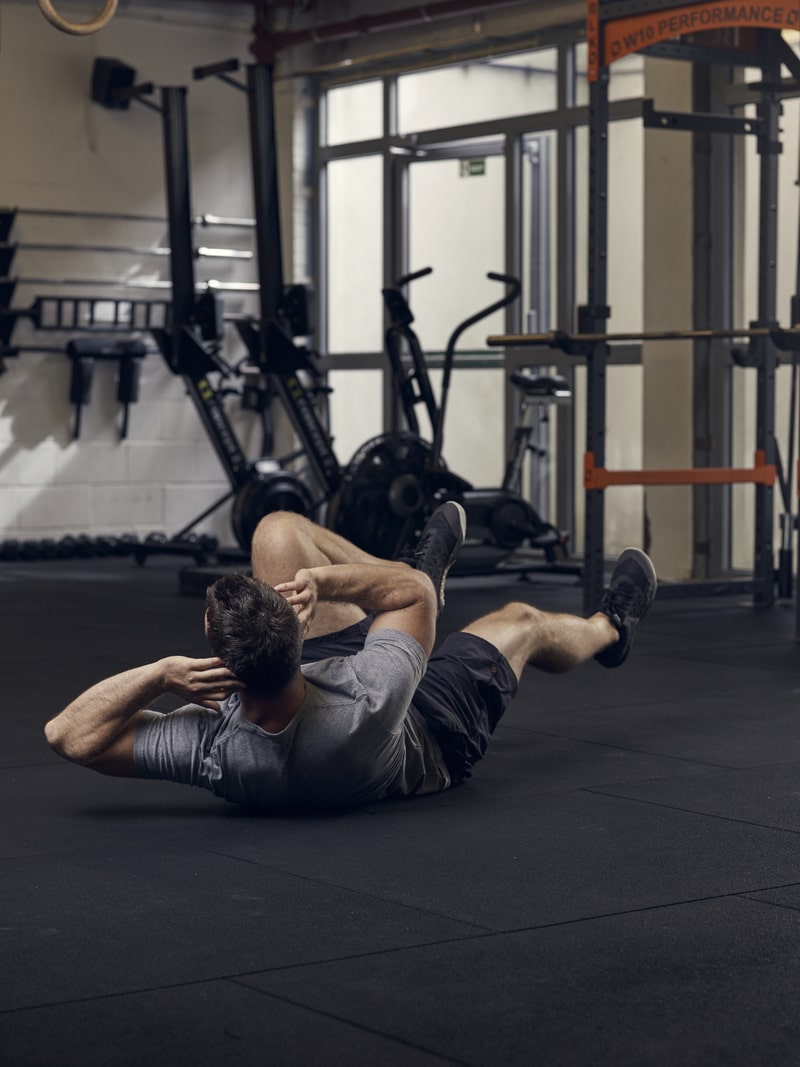
Bicycle crunch
Primary muscles: Core
Benefits of the bicycle crunch: This move is a three-in-one: keeping your legs elevated targets the lower abs, but the crunching and twisting motion also targets the upper abs and obliques, while helping with rotational strength.
- Lie on the floor with your fingertips by your head and feet slightly off the floor.
- Bring one knee in and towards your opposite elbow, then twist to repeat the move on the other side.
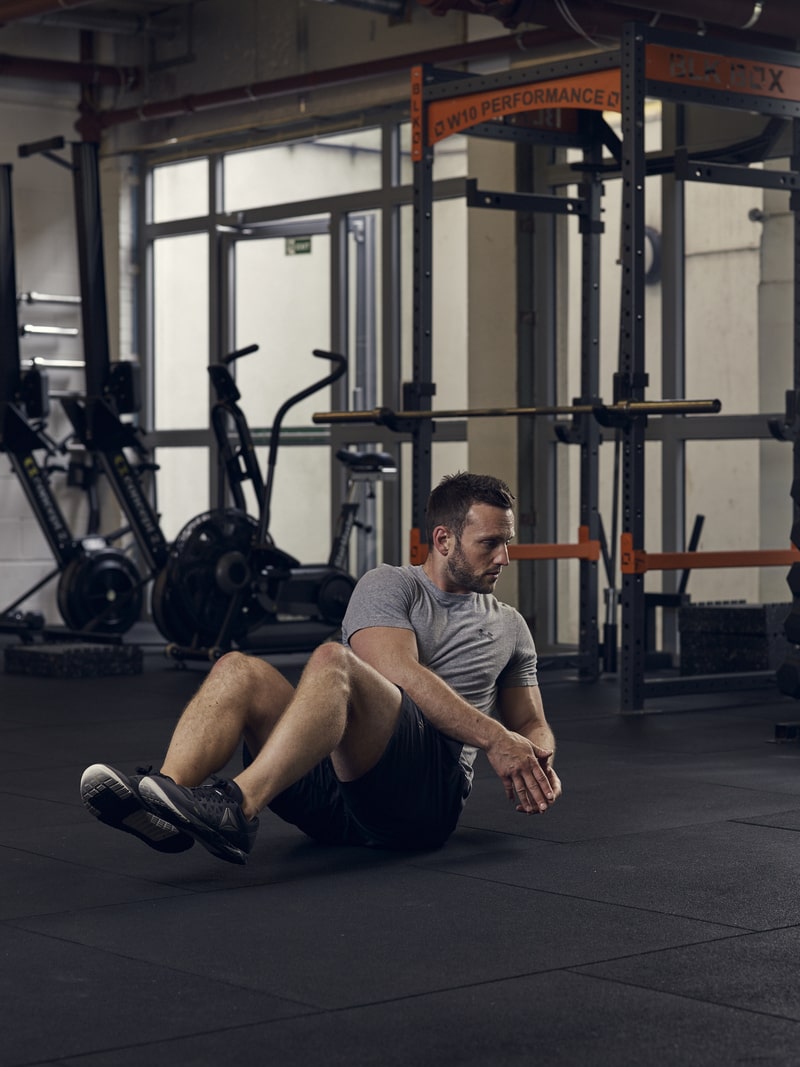
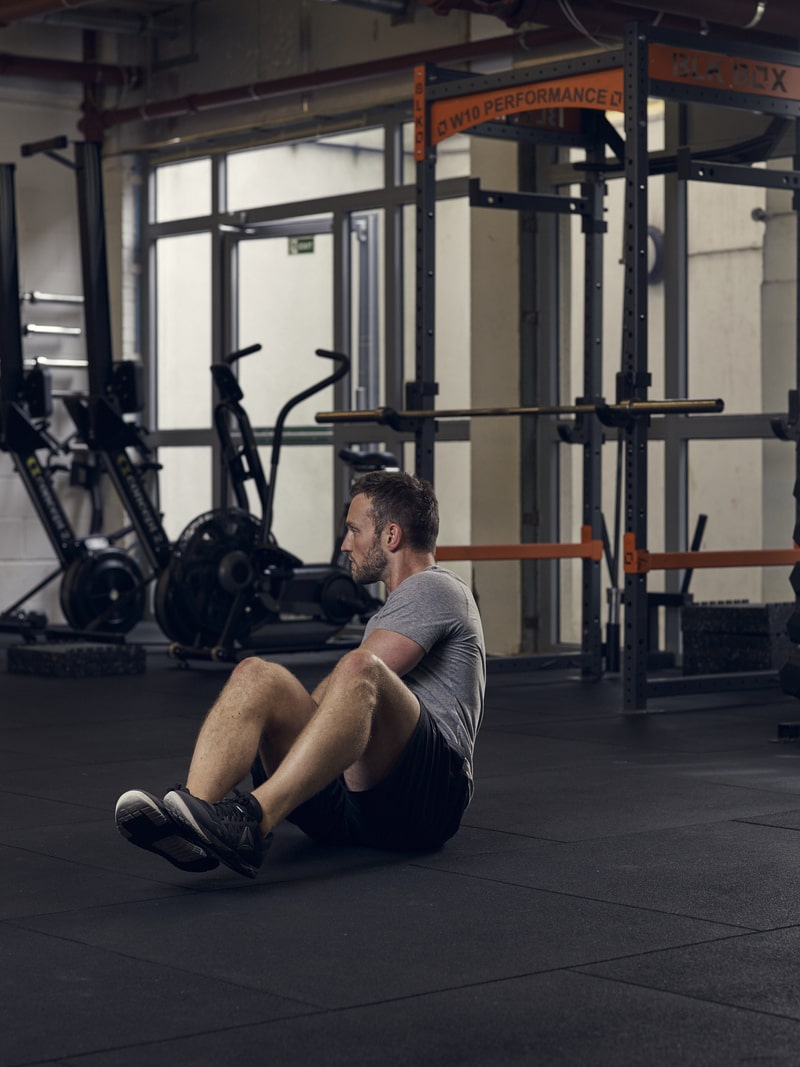
Russian twist
Primary muscles: Core
Benefits of the Russian twist: This rotational move works your obliques and entire core to give you a strong foundation for athletic performance.
- Sit with your body at around 45° to the floor, with your knees bent and back straight.
- Holding your arms out ahead of you, twist your torso to one side, maintaining the angle of your upper body to the floor.
- Then twist to the other side.
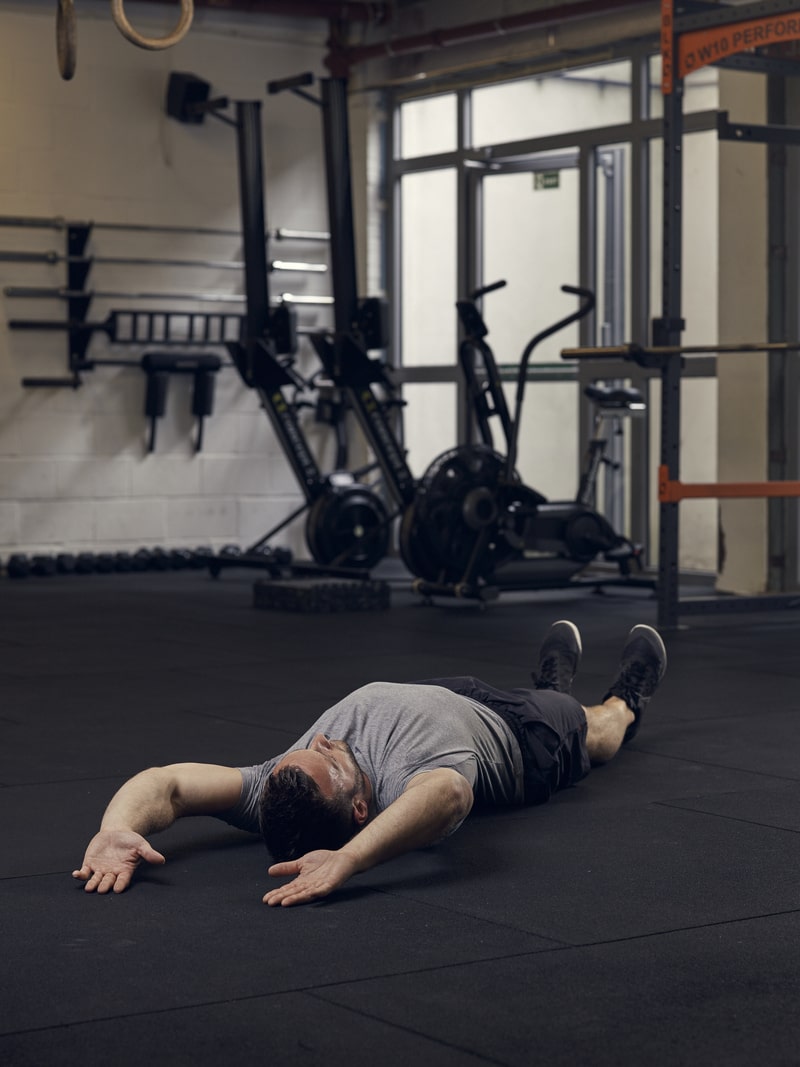
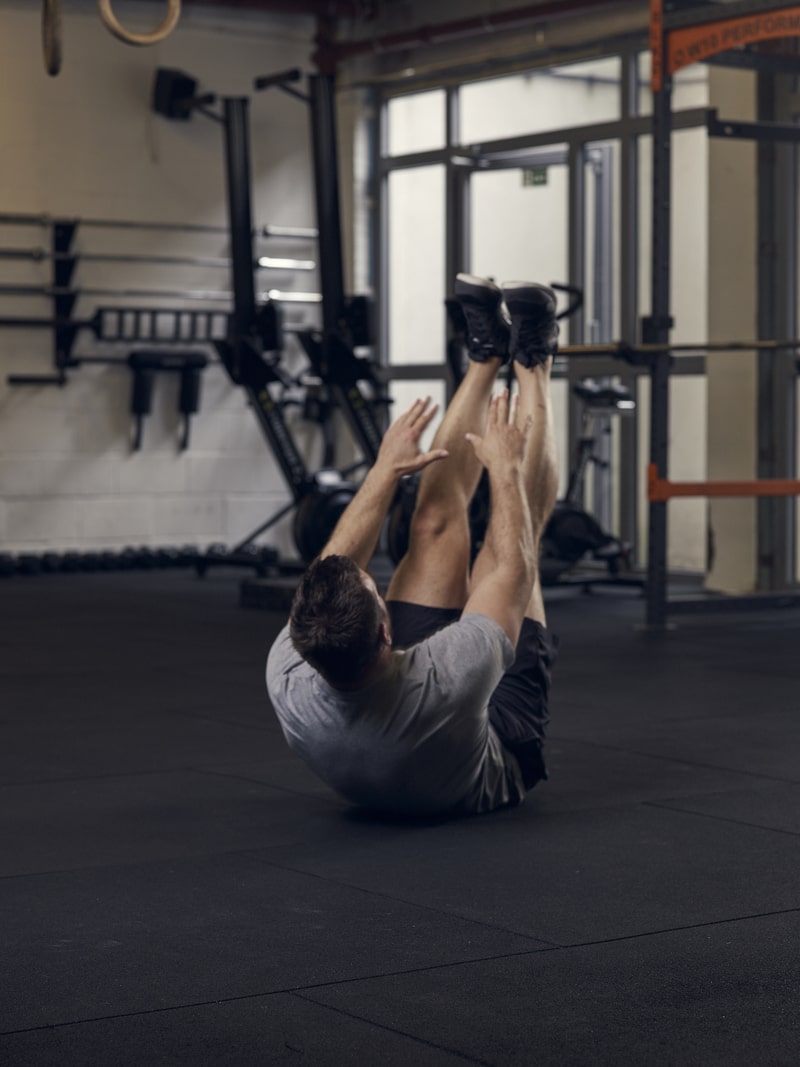
V-sit
Primary muscles: Core
Benefits of V-sits: Most people do this move explosively, but if you can do it slowly and under control, it’s a sign that you’ve built serious abs strength. Still jerking your way through the movement? Regress to the pike crunch and work your way up.
- Lie on your back with your arms and legs out straight.
- Lift your legs till they’re 45˚ to the floor and raise your upper body to meet your legs, stretching your arms toward your shins.
- Hold this position for a moment, then go back to the start position.

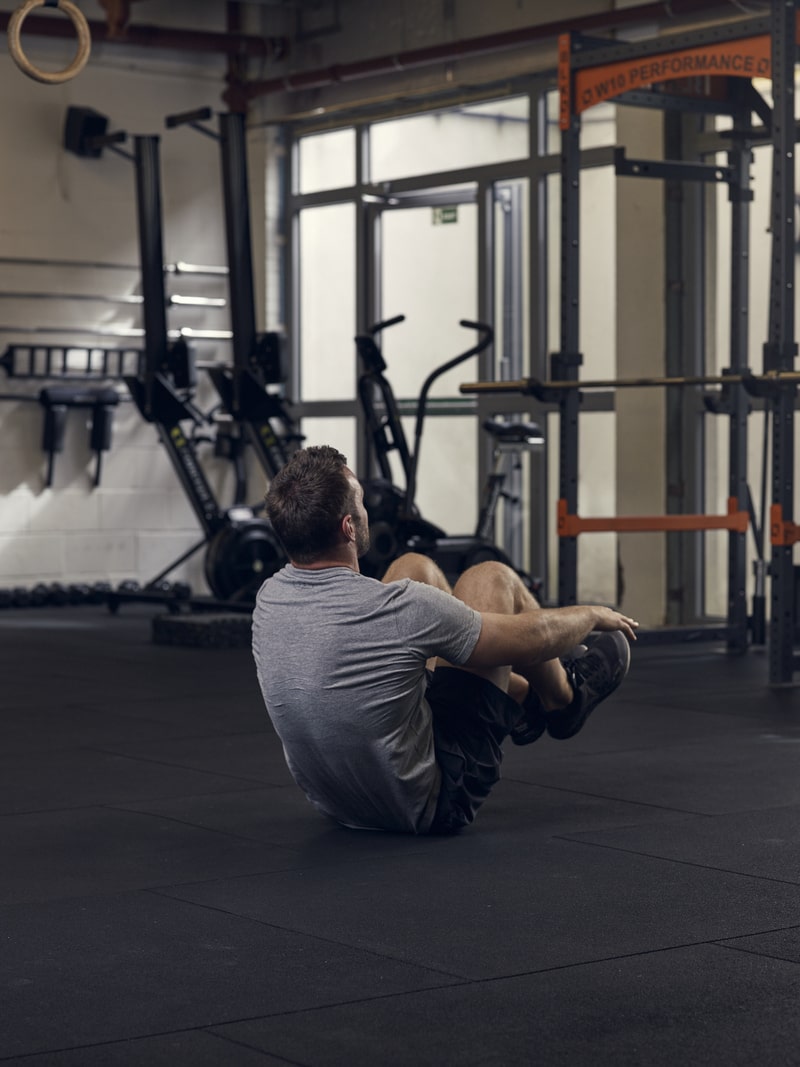
Pike crunch
Primary muscles: Core
Benefits of the pike crunch: Though most abs moves are prone to a bit of cheating, it’s hard to do that with the pike crunch – it’s almost self-correcting. Do it with your arms and body straight, and it ensures all the focus is on your abs.
- Lie on your back with your arms by your sides.
- Bring your knees in towards you as you crunch up with your chest.
- Pause at the top, then lower under control.
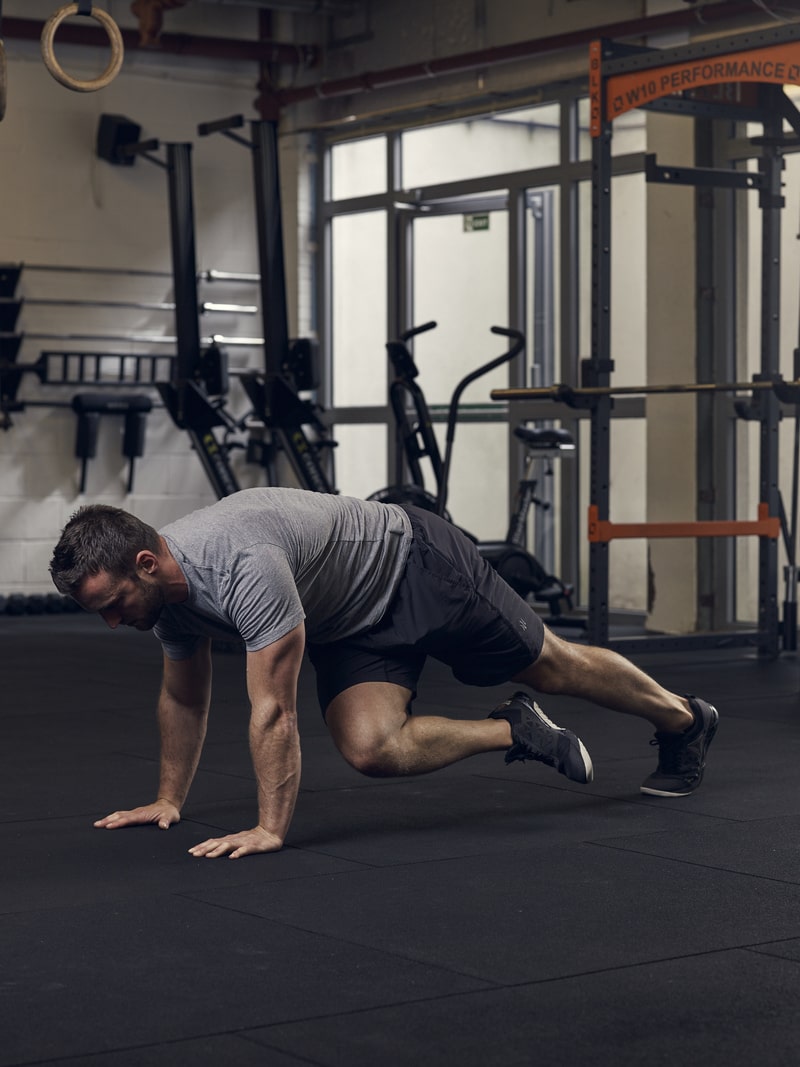
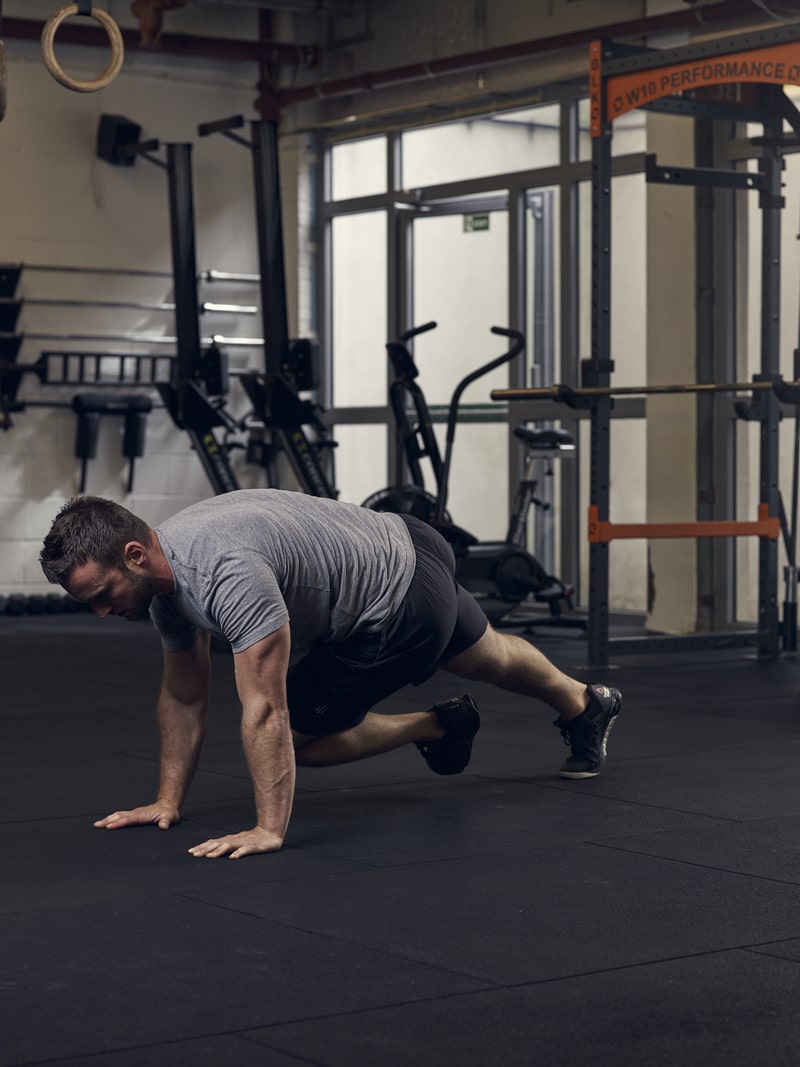
Mountain climber
Primary muscles: Core, shoulders
Benefits of mountain climbers: This move can be done for speed and fat loss with high reps and short toe-touches on the floor. But by adding a twist and bringing your knee across your body, as shown here, you’ll work your abs.
- Start in a position similar to a sprinter on the starting blocks.
- Bring one knee forward and across your body, then back to the start.
- Repeat with the other leg, keeping the movement slow and controlled.
Full-body bodyweight exercises
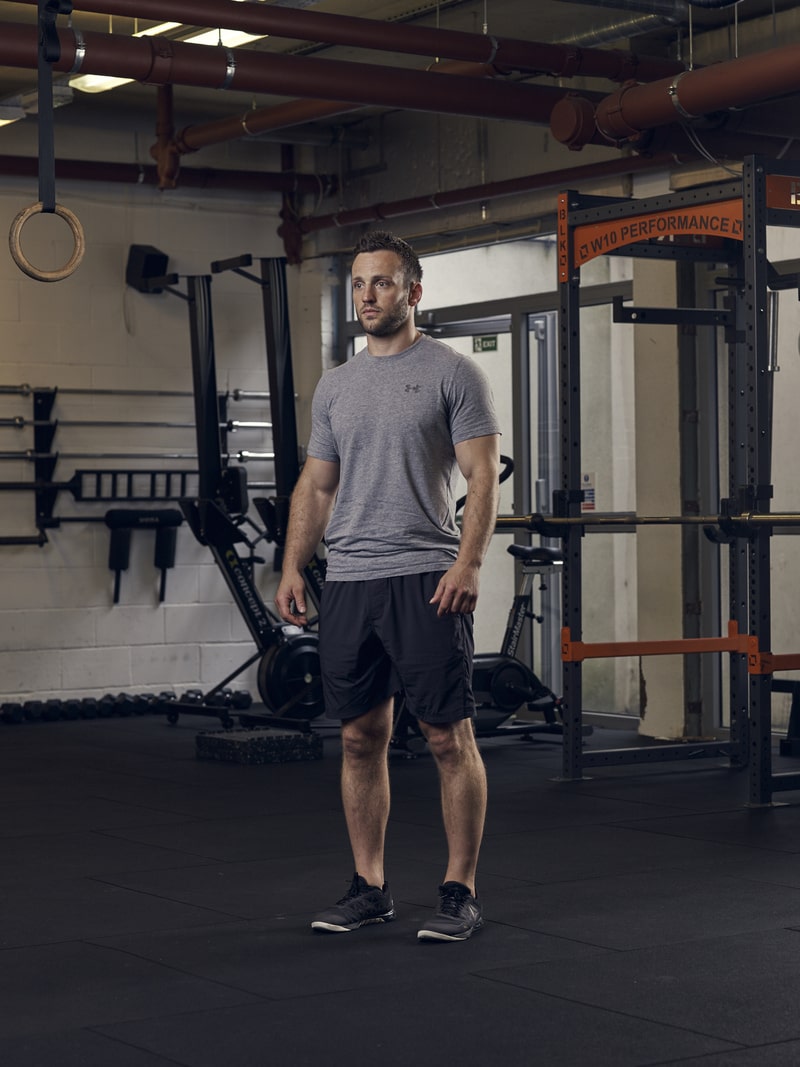
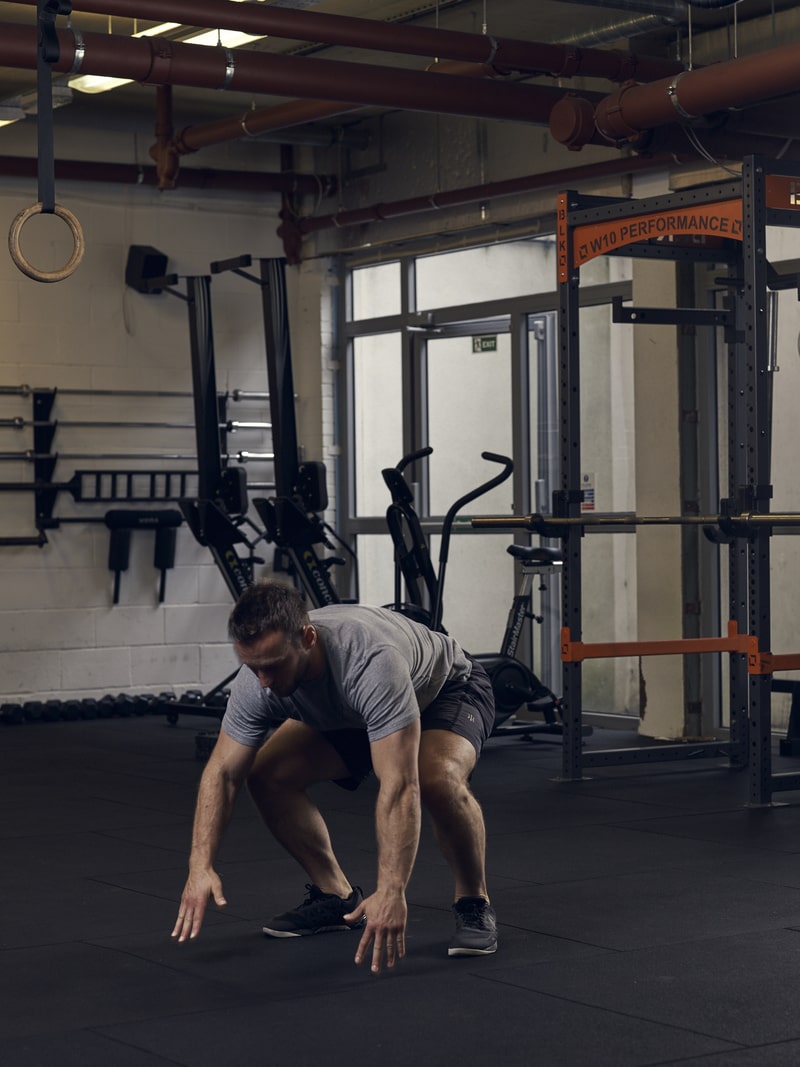
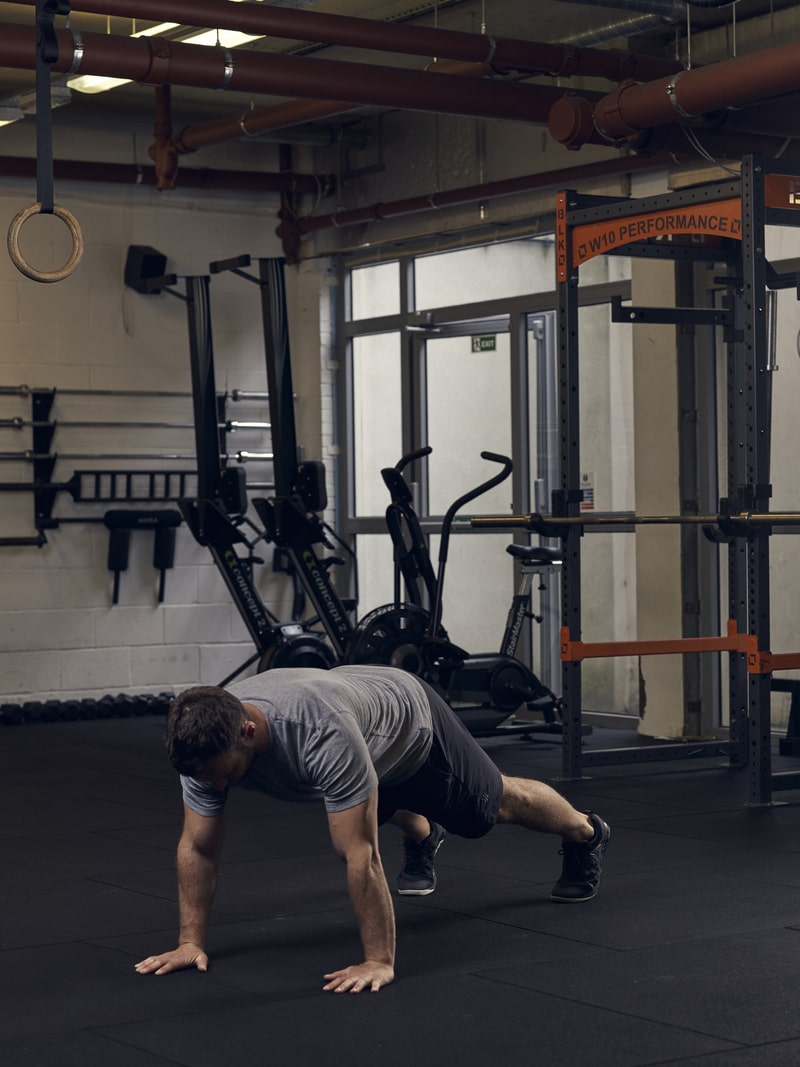
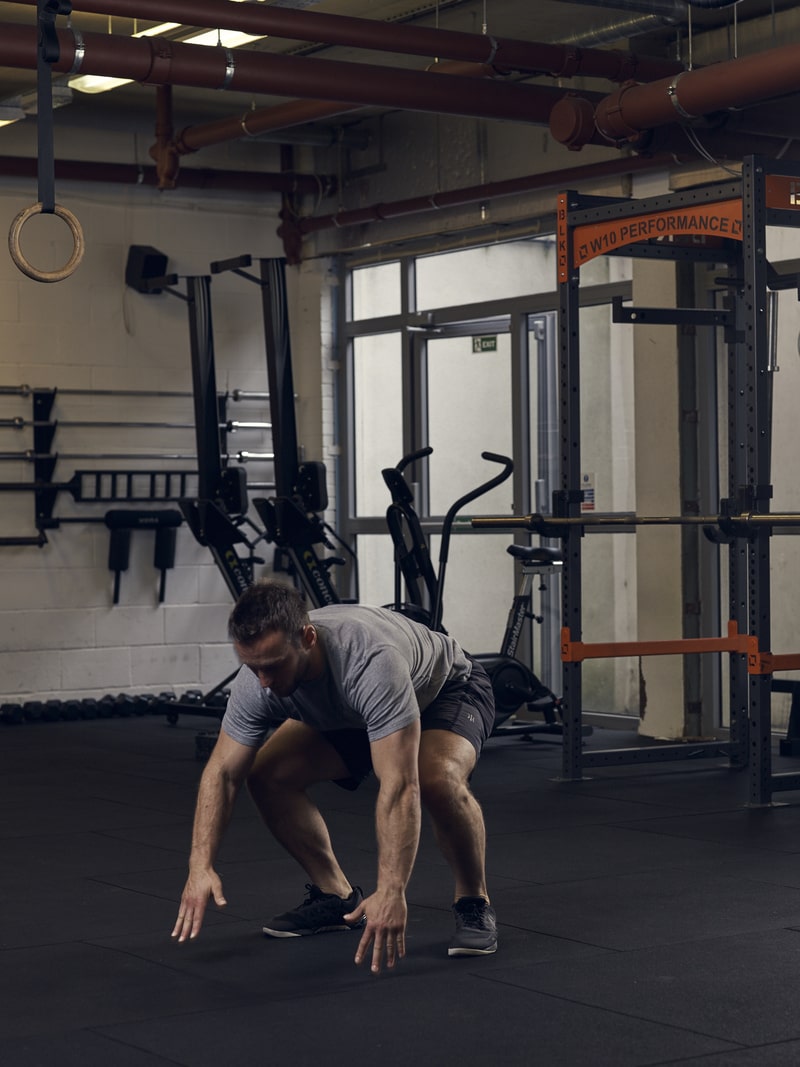
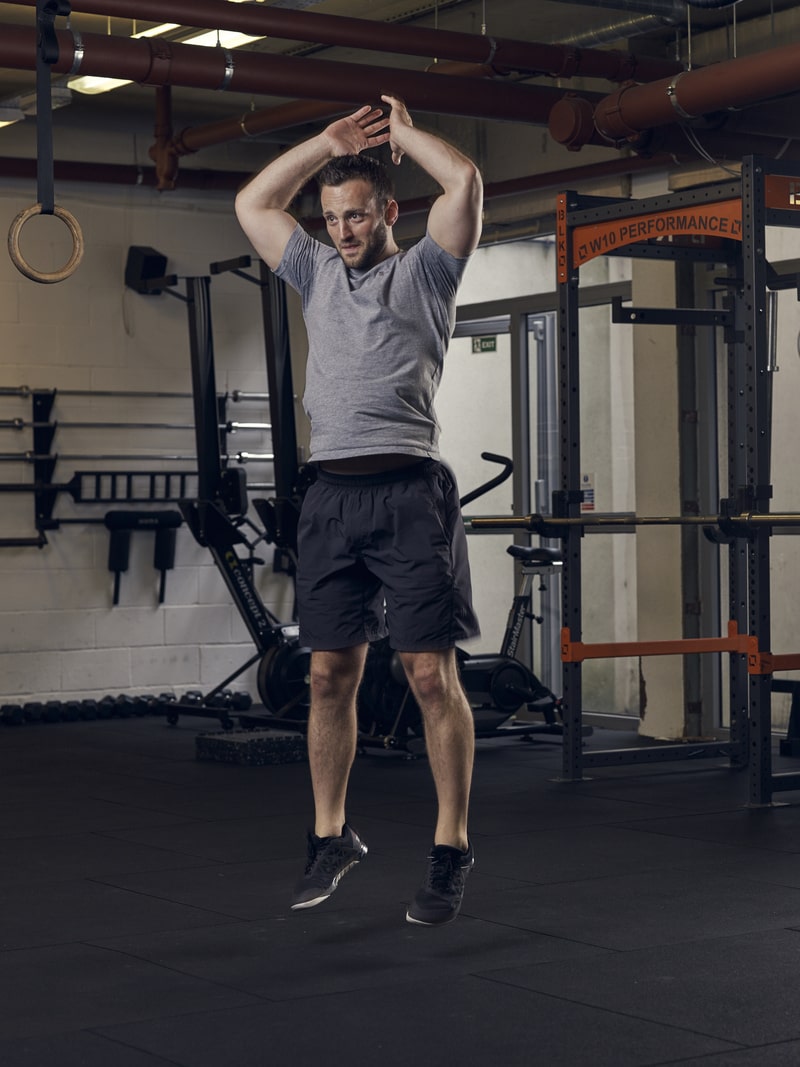
Half burpee
Primary muscles: Quads, hamstrings, shoulders, core
Benefits of half burpees: This go-anywhere cardio move is the perfect way to build conditioning quickly with minimal technique requirements or risk of injury. And it’s impossible to cheat, or get wrong. Get on the floor, get up and jump, and make sure you do the clap.
- Drop to the floor, touching your chest to the floor at the bottom of the move.
- Hop back to your feet, then jump in the air, clapping your hands overhead at the top of the move.
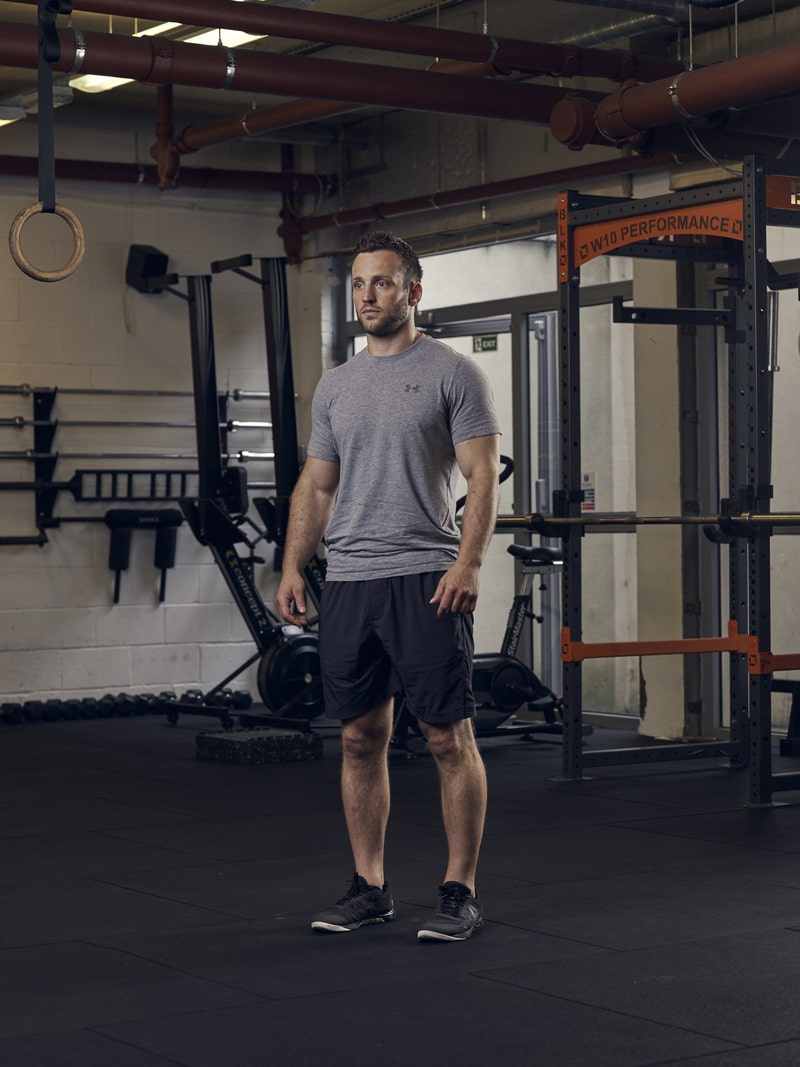
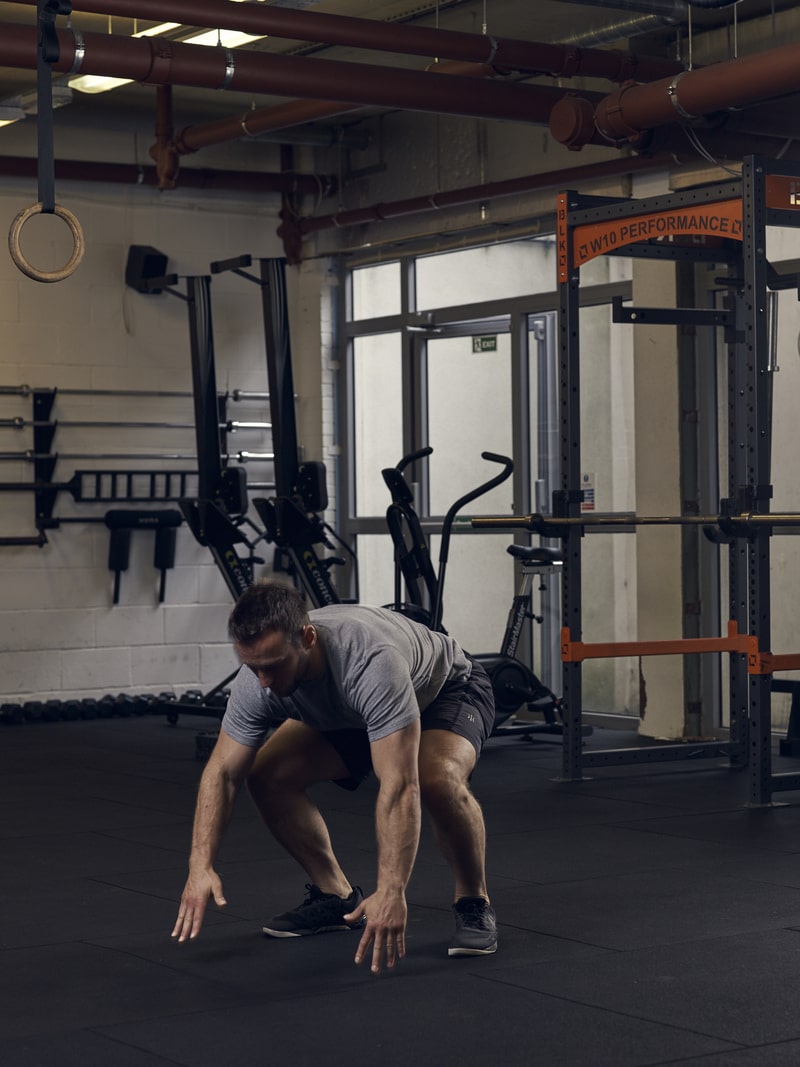
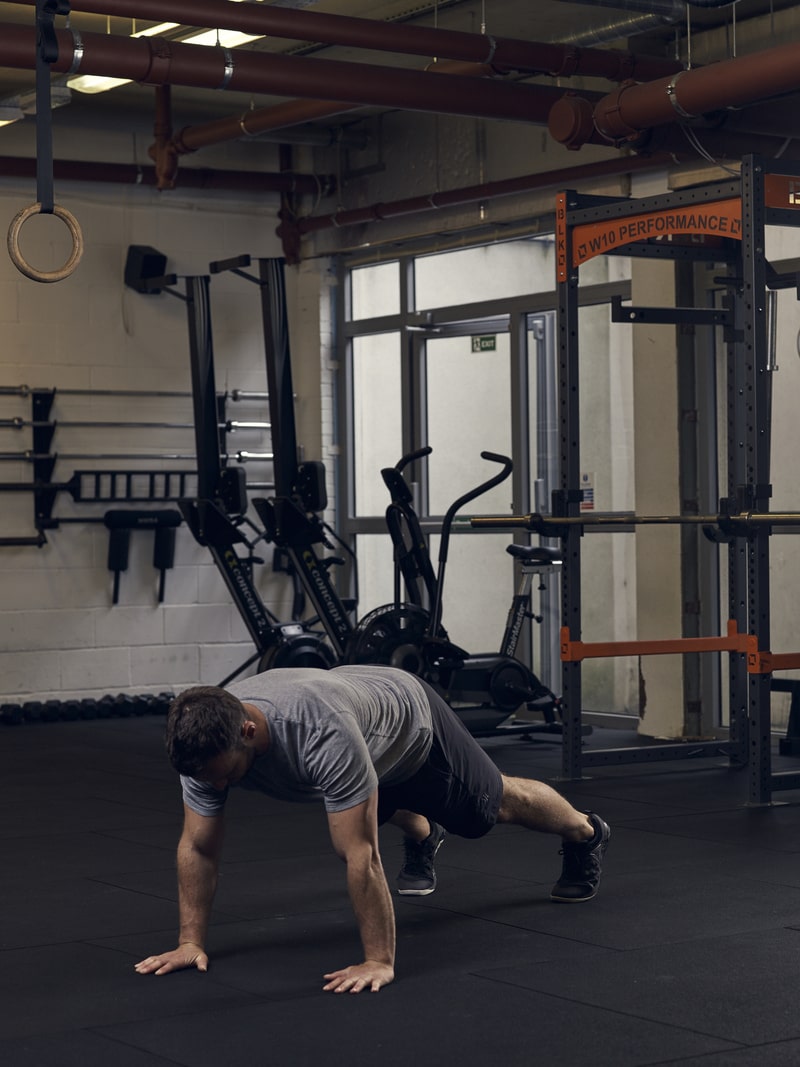
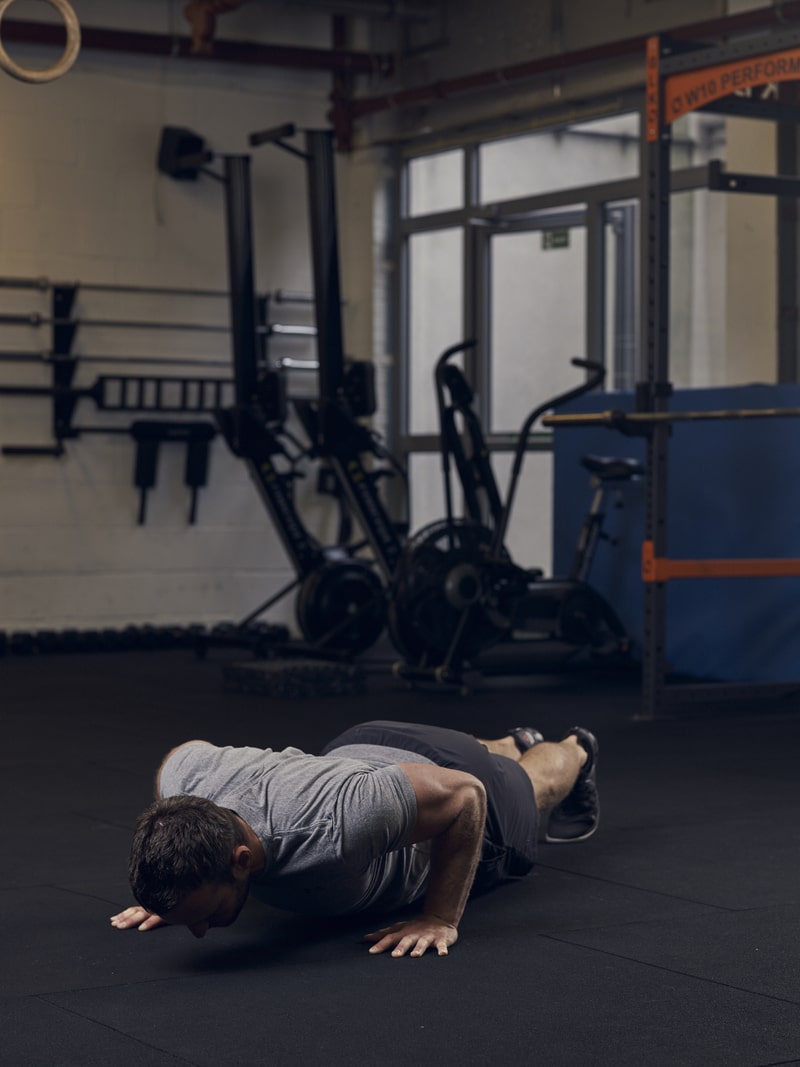
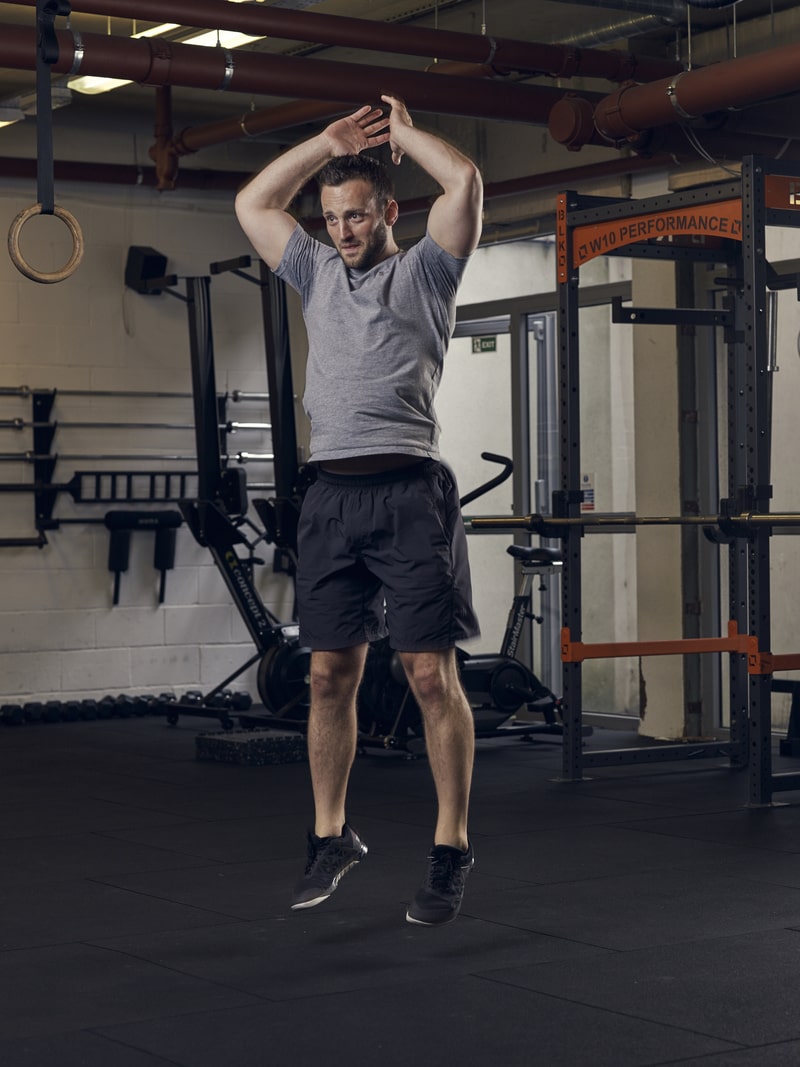
Burpee
Primary muscles: Quads, hamstrings, chest, shoulders, core
Benefits of burpees: The stricter version of the burpee adds a muscular element to the workout, bringing in some extra chest and arm work alongside the cardiovascular hit. See if you can do 100 reps over 10-12 minutes – that in itself is a solid day’s workout.
- Drop into a press-up position and do 1 rep, touching your chest to the floor at the bottom of the move.
- Hop back to your feet, then jump in the air, clapping your hands overhead at the top of the move.
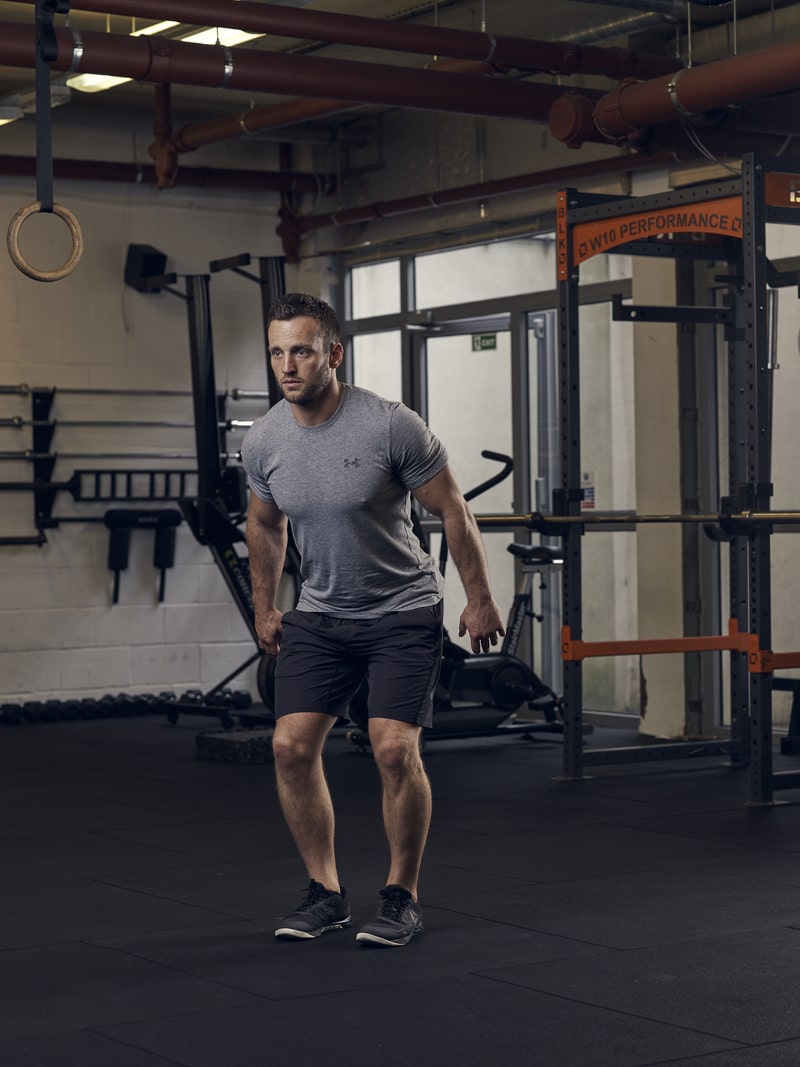
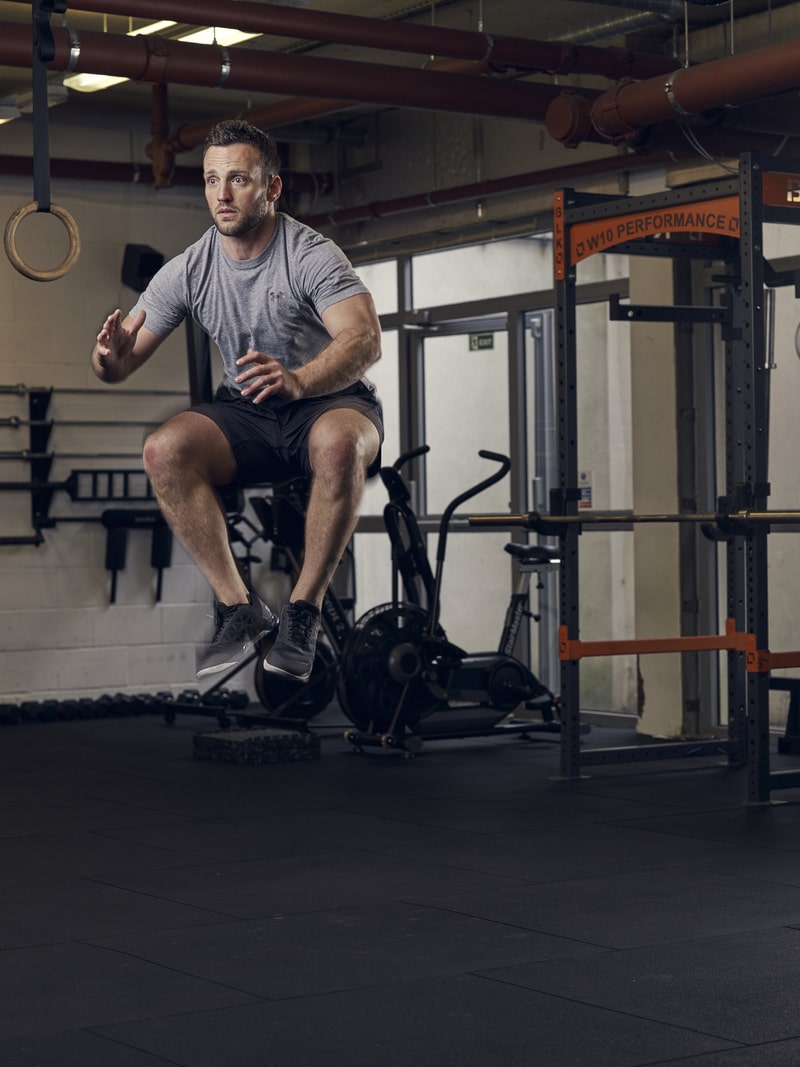
Tuck jump
Primary muscles: Glutes, quads, hamstrings
Benefits of tuck jumps: Whether you jump onto a box or bench or just jump up off the floor, this move will build explosive power – or, if you do it for reps, cardio endurance. Remember to get your knees as high as possible.
- Bend your knees slightly and then jump as high as possible, bringing your knees up towards to your chest at the top of the move.
- Land as softly as you can.
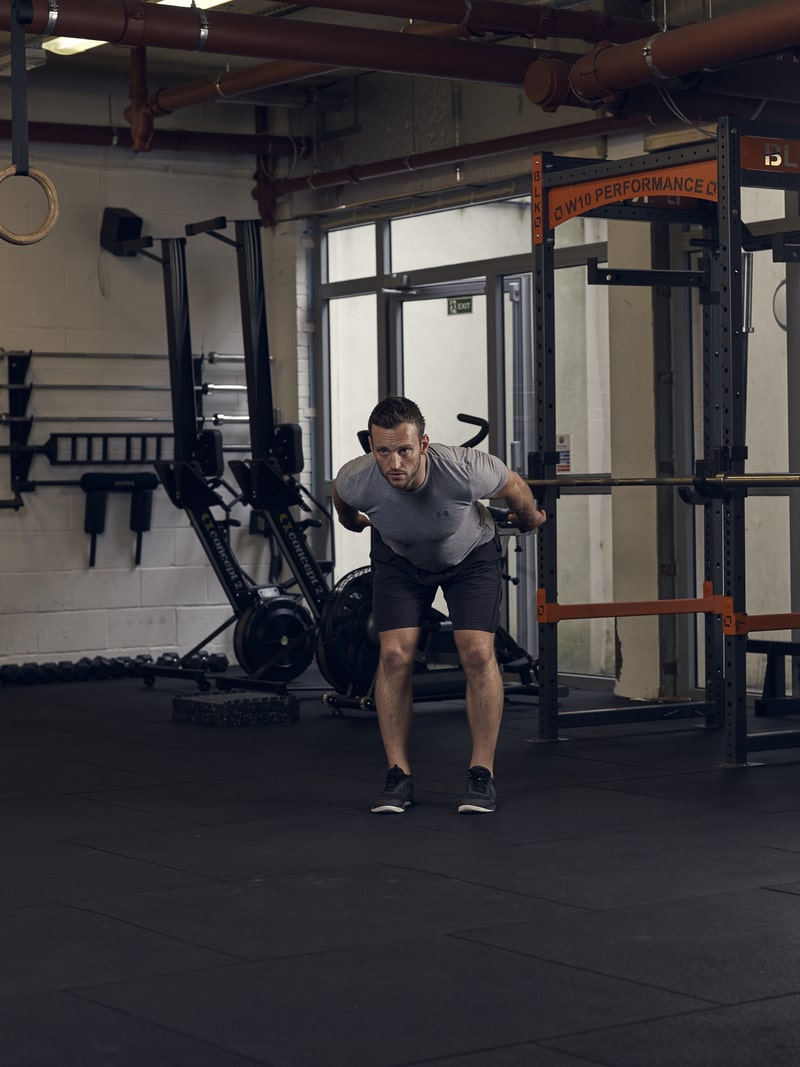
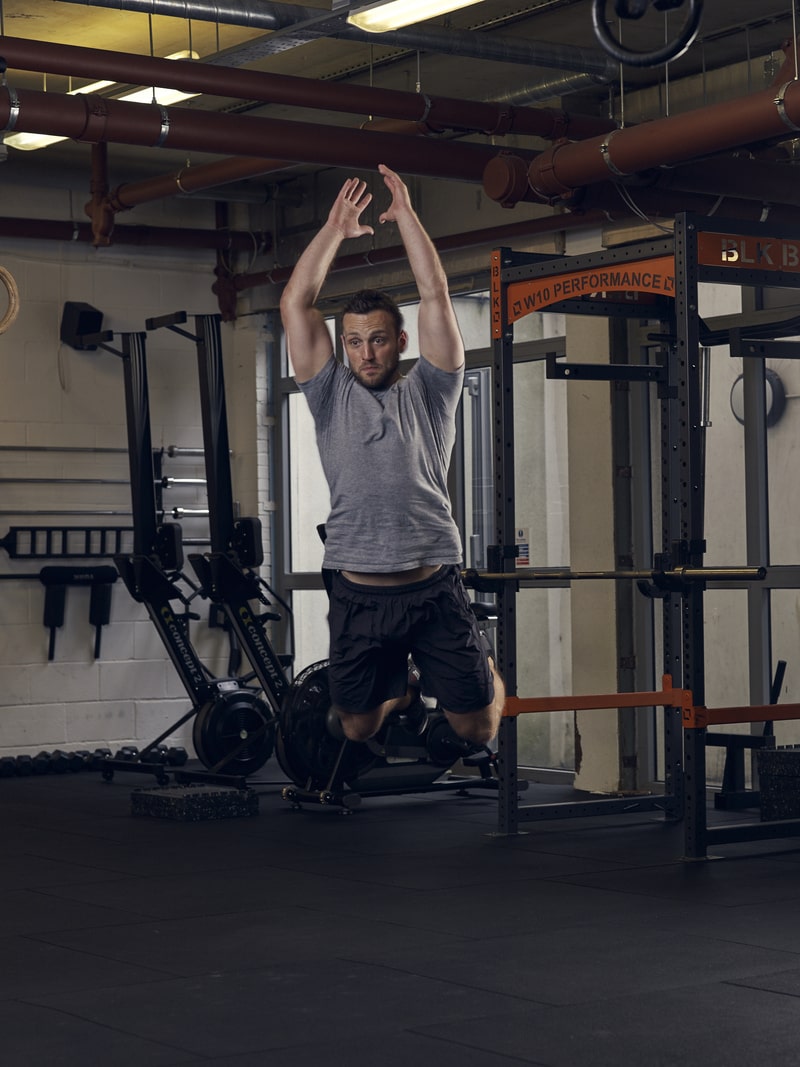
Broad jump
Primary muscles: Glutes, hamstrings, calves, core
Benefits of broad jumps: Jumping for maximum height or distance will build explosive power, but going long is less risky than trying to land on a box. As a rule of thumb, you should be able to broad jump at least your own height.
- Stand tall, then do a slight squat, swinging your arms behind you.
- Jump forward, aiming to make a plank position in the air.
- Try to land as softly as possible.
The post Best Bodyweight Exercises To Build Strength appeared first on MensFitness.
[ad_2]Article link
